Nutrition Science & Dietetics News
Educator Award Winner
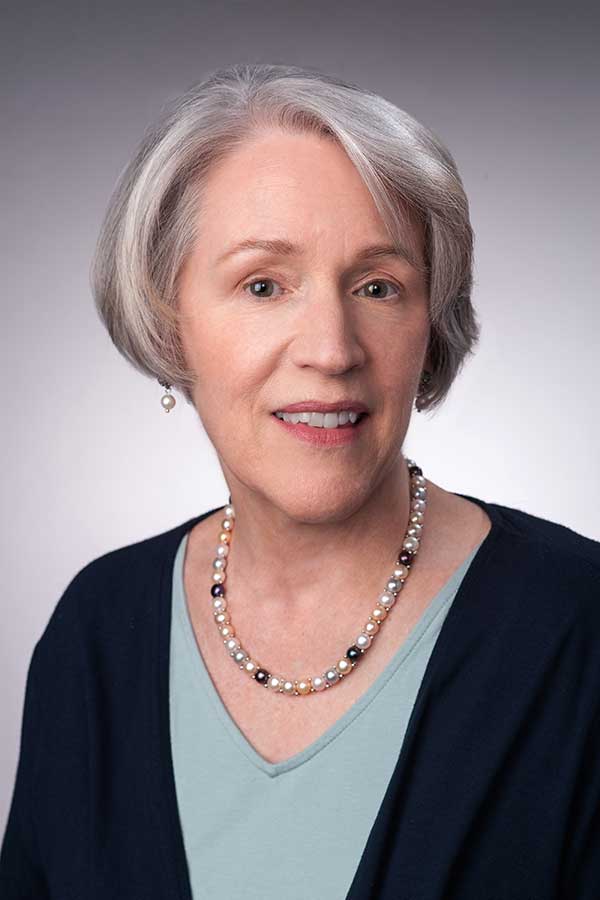
Kay Stearns Bruening, an assistant professor in Falk’s Nutrition Science and Dietetics program, was selected by a committee of her peers as the 2022 North East Region Outstanding Dietetic Educator in the Didactic Program in Dietetics category from the Academy of Nutrition and Dietetics. The Outstanding Dietetics Educator Award recognizes the teaching, mentoring, and leadership activities of faculty in ACEND®-accredited dietetics education programs.
Kay is the director of the Falk College Nutrition Assessment, Consultation, & Education Center and serves as a program reviewer for the Accreditation Council for Education in Nutrition and Dietetics (ACEND®). She has collaborated with international dietetic education programs in Chile, South Korea, and Qatar. She has served as an item writer, item reviewer, and on the Item Reclassification Panel for the Commission on Dietetic Registration examination for registered dietitian-nutritionists. She is a Fellow of the Academy of Nutrition and Dietetics, belongs to six dietetic practice groups, and completed advanced training in child & adolescent weight management.
The Nutrition Science and Dietetics program is accredited by Accreditation Council for Education in Nutrition and Dietetics (ACEND®) and prepares students to begin careers as RDNs or DTRs.
Faculty of the Year Awards

Matthew Mulvaney, an associate professor in the Department of Human Development and Family Science and chair of the Faculty Council, thanked all faculty members who submitted nominations and the nominees who provided documentary support for the council’s consideration.
“This is both one of the most rewarding and one of the challenge parts of serving on the Faculty Council,” Mulvaney said. “We had a large number of nominations that came in, all of them were excellent, and all (faculty members) are making very important contributions to the college. It’s always a hard decision and this year was no exception.”
Here’s a look at the 2022 honorees with comments from their award presenters:
Kenneth Marfilius
Director of Online and Distance Education and assistant teaching professor in the School of Social Work
Falk Faculty of the Year Award for Excellence in Service
From presenter Yvonne Smith, associate professor in the School of Social Work:
“In 2021 Dr. Marfilius simultaneously served as director of the Undergraduate Social Work Program and the Online Master of Social Work Program, roles which, in their own right, require extraordinary vision, dedication, organization, and time. In light of his exemplary service, he was named Director of Online and Distance Education. This new position—a first for Falk College—puts him at the helm of five rapidly growing online programs that make Falk College’s graduate curricula increasingly accessible to students across the nation and around the world.
“The significant challenge of designing, staffing, and managing these nascent programs is hard to overestimate. Dr. Marfilius, a veteran of the United States Air Force, has proven to be a steady, competent pilot who can, as we often say at Falk College, ‘build the plane as we fly it.’ In 2021, Dr. Marfilius’ exemplary service was recognized with the Syracuse University Center for Disability Resources 2021 Faculty Recognition Award and the Syracuse University One University Assessment Award for best use of results.
“But his achievements in college and departmental leadership roles are only some of the ways Dr. Marfilius has served our community. He routinely mentors students and serves as a liaison to the D’Aniello Institute for Veterans and Military Families. Notably, Dr. Marfilius has emerged as a leading public voice on the mental health needs of returning veterans and their families. He has done all of this while teaching graduates and undergraduates and serving as PI (principal investigator) or co-PI on multiple research and training grants.”
David Meluni
Assistant teaching professor in the Department of Sport Management
Evan Weissman Memorial Faculty of the Year Award for Teaching Excellence
From presenter Jane Burrell, associate teaching professor in the Nutrition Science and Dietetics program:
“Dave Meluni is a teacher who consistently receives excellent student evaluations. He is at the forefront of innovations in teaching, both in terms of classroom practices and course development, to meet emerging trends in the field. He also is exceptionally strong at developing collaborations with high-profile industry leaders to complement course content and provide students with real-world engagement opportunities.”
“In 2021 Dave taught seven courses. As his nomination letter highlights, Dave is an exceptional teacher ‘specializing in courses that are challenging to find qualified faculty to teach.’ Dave teaches students to connect to real-world experiences in sales and marketing that prepare graduates to obtain highly competitive and lucrative employment opportunities. Dave is ahead of the curve in teaching and innovation. A prime example includes the rapid development of a new course, Name, Image, and Likeness, which he created in response to the NCAA’s 2021 ruling that enables student-athletes to monetize their name. This was the first and only such course in the country that provides guidance and tangible skills that will prepare student athletes and their advocates to benefit from their name and talents.
“Dave also brings his expertise to bear outside of the classroom by overseeing the sales club, which was very successful in the National Collegiate Sales Competition. As a teaching professor, preparing highly qualified students and graduates is essential. Dave’s experience in the profession, his infectious enthusiasm, and his willingness to help his students grow and interact with industry make him an exceptional teacher.”
Latha Ramalingam
Assistant professor in the Nutrition Science and Dietetics program
Falk Faculty of the Year Award for Excellence in Research
From presenter Patrick Walsh, associate professor in the Department of Sport Management:
“Dr. Ramalingam, who is in her second year in Falk College, had an extremely productive 2021. She published eight peer-reviewed articles, several of which are in top-tiered journals in nutrition and one in a highly respected journal in the field of cardiovascular sciences. In addition, she co-authored five conference presentations and was invited by Syracuse University’s Department of Biology to give a research talk titled ‘Early life programming of obesity.’ On top of the publications and presentations, Dr. Ramalingam submitted five internal research grants as PI (principal investigator) totaling $48,000, all of which were funded, and submitted an impressive eight external research grants totaling over $1 million.
“Her commitment to research is also evident through the mentoring of students. Her mentorship as advisor to two master’s students in Nutrition Science and nine undergraduate students in her research lab has led to student publications, SOURCE grant funding, and a Pre-Doctoral Fellowship award from the American Society of Nutrition–the first time a Nutrition Science student at Syracuse University has received this honor.
“Dr. Ramalingam notes that her work ‘focuses on the role of bioactives, specifically fish oil, in preventing maternal and paternal obesity. Approximately 30% of the women of reproductive age suffer from obesity. Dietary intervention during this critical fetal developmental window might provide opportunities to decrease the burden of metabolic disease later in life.’ It is Dr. Ramalingam’s research goal is to provide additional scientific evidence to reduce/prevent obesity using non-pharmacological approaches.”
Class of 2022 Honored with Nutrition Science and Dietetics Awards
The Nutrition Science and Dietetics in Falk College is pleased to recognize the outstanding work of its undergraduate and graduate students for excellence.
Emily Gere Coon Award: Mariana Perez Lugo
The Emily Gere Coon Award was established in 1952 by Harold Coon in memory of his wife, a faculty member in the College for Human Development, who was also a member of the first graduating class in 1922. The award is presented to the sophomore with the highest academic average in Nutrition in their freshman year.
Nutrition Science and Dietetics Research Award – Undergraduate: Mariana Perez Lugo
The Nutrition Science and Dietetics Research Award is given to an undergraduate student for outstanding accomplishments in research. Undergraduate students in nutrition submit a one-page description of their research, an example of their research, an abstract and a letter of recommendation from their advisor. Mariana is one of the few students who immersed herself in research in her first year. She is pro-active, dedicated, and hardworking. She received a SOURCE grant and was recently selected to be McNair scholar. We are excited to see the other accolades Mariana will receive during her time at SU.
Florence B Potter Memorial Award: Alyssa Quinn
The Florence B Potter Memorial Award was established by the New York State Federation of Home Bureaus in honor of Florence B Potter. Alyssa has worked as a learning assistant for our lower-level undergraduate foods classes. She is an excellent student who is fully engaged in the dietetics curriculum.
Marjorie V Dibble Scholarship Award: Eliza Mulloy
The Marjorie V Dibble Scholarship Award was established in 1977 in recognition of Professor Dibble’s 25th Anniversary with the College for Human Development. The award provides scholarship to a full-time sophomore or junior in the Nutrition Science and Dietetics program, with good academic standing, who is interested in a career in this field. Eliza is an exceptional student and critical thinker. She plans to pursue dental school after she completes her degree. She is a strong student academically and we are pleased that she chose the nutrition science program.
Ruth Tolley Award: Junhui Yang
The Ruth Tolley Award was established by the Women of the University Community in honor of Ruth Tolley. It is presented to a female student, completing their junior year, who has demonstrated outstanding academic achievement and clearly stated career goals consistent with the field of Nutrition. Junhui “Carol” is an exceptional student who is focused and has tremendous respect for the science of dietetics and how she can add to the field with the goal of improving human health. Carol was a teaching assistant in NSD 225 for the Summer College program in 2022 and contributed to a robust and exciting course for high school students interested in STEM.
Victoria F Thiele Scholarship Award: Elizabeth Kot
The Victoria F Thiele Scholarship Award was established in 1981 in memory of Dr. Victoria F Thiele, in recognition of her contributions to the College for Human Development. The award is presented to full-time sophomore or junior students majoring in Nutrition. Elizabeth’s professors noted that she is an excellent critical thinker. She has excelled academically and has a goal of becoming a sports dietitian.
Victoria F Thiele Scholarship Award: Tess Palin
The Victoria F Thiele Scholarship Award was established in 1981 in memory of Dr. Victoria F Thiele, in recognition of her contributions to the College for Human Development. The award is presented to full-time sophomore or junior students majoring in Nutrition. Tess is highly engaged as the Volunteer Coordinator for NEPA and brings new ideas and energy to the club this year. We are excited to see watch Tess move through the remainder of her time at SU and know she will continue to make a significant contribution to the department and university.
Peer Leader in Nutrition Science and Dietetics Award: Madison Baker
The Peer Leader in Nutrition Science and Dietetics Award is given in recognition of leadership. The recipient is nominated by their peers. Madison has volunteered in several leadership roles while at SU that have allowed her to develop strong leadership. She was a Leadership Intern at the Mary Ann Shaw Center for Public and Community Service where she developed and trained student volunteers for community nutrition education programs. She was the Treasurer of the Nutrition Education and Promotion Association and an Undergraduate Teaching Assistant for the Nutrition in Health course. Of note, Madison revitalized NEPA from its dormant state due to the pandemic. The student body membership is now robust, and students are enjoying regular activities including guest speakers, yoga and trivia events and a thriving Instagram page. She will begin her dietetic internship at Syracuse University this fall.
Selleck Award: Olivia Templeton
The Selleck Award is given to a senior with exceptional personal qualities, significant service to the University and highest academic average for freshman, sophomore, and junior years. Olivia is truly deserving of the Selleck Award. She not only performed well in her classes during the pandemic, but also successfully carried out an in-person research project for her honors thesis. During her time at SU, Olivia received a SOURCE grant to support her research, served in a leadership role for Slow Food SU, and worked as a campus tour guide. She will complete her degree with a Minor in Sustainable Food Enterprises and the Renee Crown Honor’s Program. Olivia is headed to Boston next year to complete her dietetic internship and master’s degree through Simmons College.
Faculty Award for Excellence in Nutrition Science: Samantha Jezak
The Faculty Award for Excellence in Nutrition Science is given to a student who has demonstrated excellence in the field of Nutrition Science. Sam has consistently been one of the top students in our program. In addition to her academic success, Sam has also taken on challenges outside of the classroom. Sam completed her honors thesis by conducting a 3-month vegetarian diet intervention study. She recently presented the results of this project at the New York State Academy of Nutrition and Dietetics Annual Meeting. Sam has also been a leader in the Slow Food SU organization over the last 3 years. Sam will be attending graduate school at Tufts University in the fall.
Falk Scholar: Samantha Jezak and Olivia Templeton
Falk College Scholars represent undergraduate students in Falk College who display academic excellence, exceptional campus and community engagement, and personal integrity. We are pleased to have two Falk scholars in the nutrition programs. In addition to the achievements previously noted, both Samantha and Olivia worked with Dr. Jessica Garay on a book chapter for the Health Professional’s Guide to Dietary Supplements, which is set to be published by the Academy of Nutrition and Dietetics later this year. They will be listed as co-authors for the Soy Protein & Plant Sterols chapter.
Vershann Icem-Wright Professional Promise in Nutrition Science and Dietetics Award: Samantha Sutton
The Vershann Icem-Wright Professional Promise in Nutrition Science and Dietetics Award is given to a student who has a well-rounded record of contribution toward the field of nutrition and exhibited personal development as a future professional. Samantha began her dietetics career as a Social Media Ambassador for Weight Watchers. She was also chosen as a Wellness Coach where she toured state to state and met Oprah Winfrey in this capacity. She has been a Teaching Assistant in a food service course and managed to balance the completion of her degree while balancing family life. She has been a role model to her peers in many ways.
Victoria Li Scholarship Award: Eleni Karakasi
The Victoria Li Scholarship Award is given to a junior or senior Nutrition major, a pillar and leader, working with the community to improve an individual’s or groups’ nutrition knowledge and/or dietary intake. The award recipient exemplifies some of Tori’s best qualities: compassion (generous with time and energy), positivity and humility. Eleni is a wonderful representative of our Nutrition program and truly embodies the qualities associated with this award. Her positive energy and enthusiasm are contagious. Despite being extremely busy as a student-athlete, Eleni has sought out opportunities to get involved with research and student organizations like Slow Food SU. Having grown up in Greece consuming a Mediterranean diet as a matter of course, Eleni was well-positioned to compare the usual American processed diet with the traditional eating patterns she knew so well and has generously shared her lived experience with her classmates. In addition to the Nutrition/dietetics major, Eleni is also completing a minor in Public Health. She has been named to the Dean’s List every year and to the ACC (Atlantic Coast Conference of NCAA) for four straight years. Her original interest was in sport nutrition, but as she has grown in the discipline, she has developed an interest in nutritional metabolism and nutritional genomics. In addition to being a varsity volleyball player, Eleni has volunteered with the Food Busters program and the SU Food Pantry on south campus. She volunteered at the Golisano Children’s Hospital in Syracuse with the SU Student Athletic Advisory Committee and gained an interest in clinical pediatric nutrition. She represented the SU student athletes on the ACC Sports Sustainability Team.
Outstanding Dietetic Intern – Director’s Award: Shaila Chohan
The Outstanding Dietetic Intern – Director’s Award is given to a Dietetic Intern for outstanding accomplishments in the Dietetic Internship Program. Shaila described herself as “very determined” and she has demonstrated this every day of her internship. She approaches everything with the highest level of professionalism, perseverance, and grace. Shaila consistently raises the bar and has many successes to celebrate throughout the internship program. She will continue to make us proud as she enters the next phase on her journey to become a registered dietitian. Congratulations, Shaila!
Susan J Crockett Prize for Student Leadership: Olivia Mancabelli
The Susan J Crockett Prize for Student Leadership is given to a student who has shown outstanding leadership qualities during their academic career. Olivia has been a leader and role model among her peers. She has pursued her graduate degree while maintaining a job at Upstate Community Hospital and has served as a Student Representative and board member in the Central New York Academy of Nutrition and Dietetics. This has allowed her to network and volunteer with registered dietitians within the Syracuse community. She will begin her dietetic internship this fall at Syracuse University.
Outstanding Graduate Assistant in Nutrition Science Award: Akriti Shrestha
The Outstanding Graduate Assistant in Nutrition Science Award is given to a graduate assistant who has provided exceptional service to the faculty. Faculty nominate worthy teaching or research candidates. This year the graduate faculty recognize Akriti Shrestha for her exceptional service, work ethic and commitment as a graduate assistant. Akriti has served as the graduate research assistant to Dr. Latha Ramalingam for two year and has been an asset in her research lab. Akriti is a recipient of the predoctoral fellowship from the American Society of Nutrition and had published one manuscript and is working on another one. She is off to Urbana Champagne for her PhD.
Outstanding Graduate Student in Nutrition Science Award: Rebecca Garofano
The Outstanding Graduate Student in Nutrition Science Award is given to a graduate student for outstanding accomplishment in leadership, citizenship, work ethic and professional promise. Faculty nominate a graduate student for this award considering their scholarship, citizenship, work ethic and professional promise. This year the graduate faculty recognize Rebecca Garofano for her academic aptitude and excellence as well as her professional dedication to the field of Nutrition Science and Dietetics. Rebecca’s master’s thesis focuses on sustainable diets in indigenous and immigrant populations. She is assessing the nutritional functional diversity of endemic/local vegetation in the agroecological/agroforestry spaces these communities maintain and protect. Rebecca is active in several Academy of Nutrition and Dietetics (AND) groups. She has organized a session for the Food & Nutrition Conference & Expo™(FNCE) for fall 2022 titled “Practicing Food Solidarity: Lessons from a Farmworker Community’s Food Pantry Vegetable Garden. Rebecca obtained monetary support for the FNCE session from the Hunger and Environmental Nutrition Dietetic Practice Group and the Latinos and Hispanics in Dietetics and Nutrition (LAHIDAN) Member Interest Group of AND. Within the Nutrition Science graduate program, Rebecca was instrumental in developing a teaching grant proposal submitted to the USDA Food and Agricultural Sciences National Needs Graduate and Postgraduate Fellowship program (NNF) titled “Investing in a Food System for Equity and Human Health: Training the Next Generation of Interdisciplinary Leaders.” In addition to this departmental award, Rebecca is the 2022 recipient of the Outstanding Dietetic Student for New York State. She will begin her dietetic internship this fall at Syracuse University.
Nutrition Science and Dietetics Research Award – Graduate: Justin Pascual
The Nutrition Science and Dietetics Research Award is given to a graduate student for outstanding accomplishments in research. Graduate students in nutrition submit a one-page description of their research, an example of their research, an abstract and a letter of recommendation from their advisor. Justin’s master’s research is unique in that it explores the intersection between nutrition and exercise science. His thesis is titled “Vitamin D3 Status and the Vestibulo-Sympathetic Reflex During Head Down Flexion in Healthy Adults.” Justin is a veteran of the United States Air Force and currently serves with the New York Air National Guard. After graduation, he will attend an armed forces PhD program to become a naval aerospace and operational physiologist with the United States Navy.
Class of 2022 Falk Scholars
Thirteen members of the Class of 2022 have been named Falk College Scholars. Falk Scholars represent undergraduate students who display academic excellence, exceptional campus and community engagement, independent research and creative work, innovation in their disciplinary field, and personal integrity. Designation as a Falk Scholar is the highest academic award conferred by Falk College on graduating seniors.
We asked the Class of 2022 Falk Scholars to describe their most meaningful experiences at Syracuse University and here’s what they wrote:
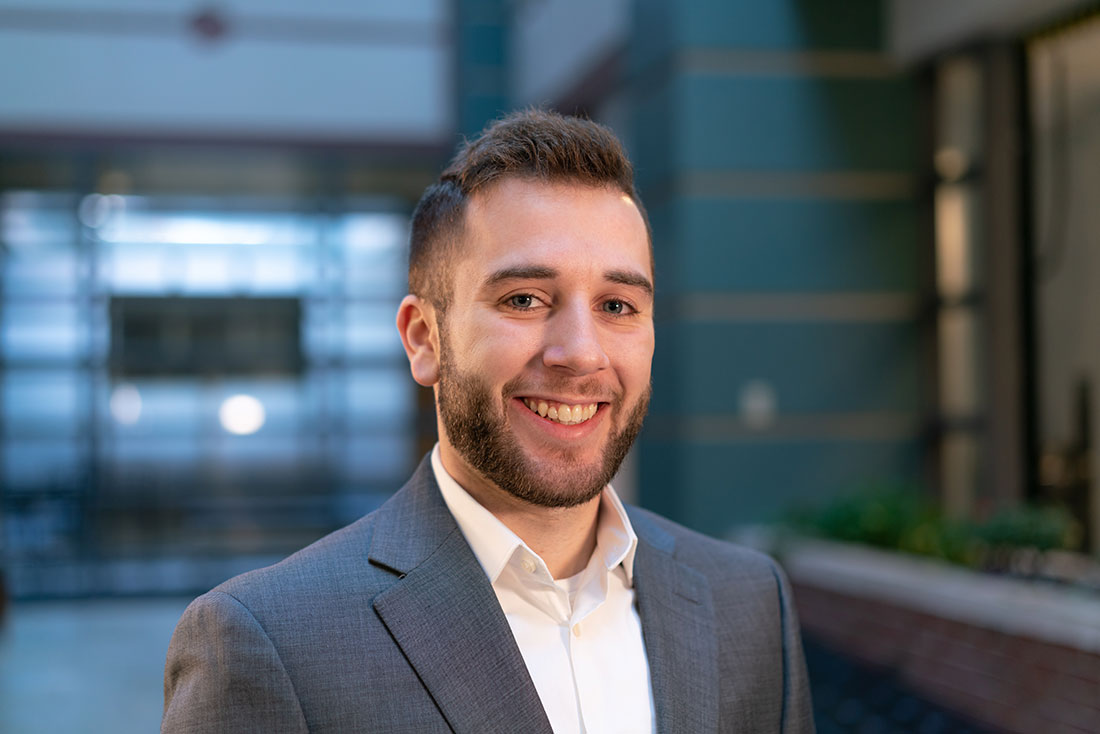
Drew Disanto, Sport Analytics
Syracuse has brought me numerous opportunities, memories, and experiences that I will carry with me for the rest of my life. My most important experience was through the Syracuse Soccer Analytics Club. My peers and I started the club during my freshman year, despite knowing very little about analytics or programming. As its vice president, this club was extremely helpful in giving me first-hand experience with data, programming, and data analysis.
Even more memorable was the aftermath of the club. Submitting our club work to various conferences and competitions was exhilarating enough. When our paper started to win and place at these competitions, I was ecstatic. It was validating to see our hard work being recognized and praised by several industry professionals. This club was exceedingly beneficial to my career here at Syracuse, and I do not think I’d be where I am today without everything I learned through it.
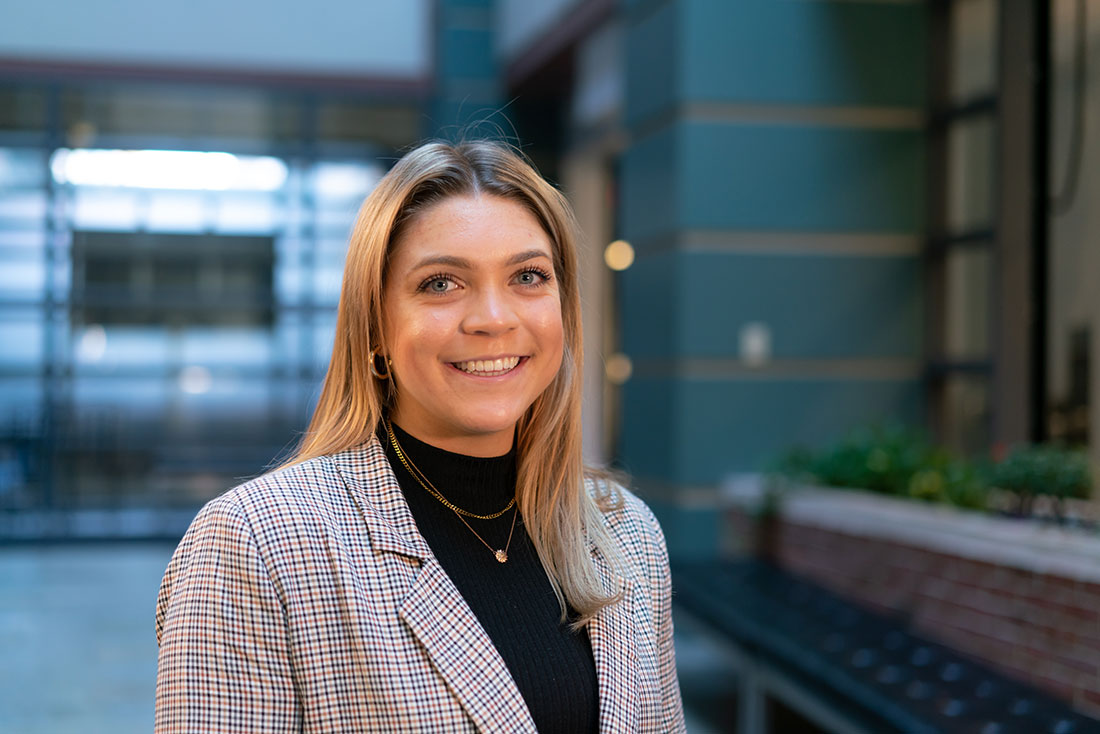
Samantha Jezak, Nutrition Science and Dietetics
Falk College has been a close community for me over the past exciting, rigorous, and innovative 4 years of my life. I quickly became involved in nutrition research my freshman year. It wasn’t necessarily what I had formulated in my head (white lab coat, goggles, combustion); it was literature review, consisting of PubMed readings after readings and discussions with my research advisor, Dr. (Jessica) Garay. Little did I know these readings would lead to the research project that has ultimately defined my career path.
It sounds glamorous to be a “scientist,” but nobody tells you about the tedious work that must be done behind the scenes to bring a project to life. As demanding as it was, I am so fortunate to have the experience of writing, applying, and conducting my own research project, especially alongside one of my most well-respected peers, Olivia Templeton. This research experience has taught me things that can’t be taught in the classroom. I am honored to say that Falk College has molded me into a well-prepared individual for pursuing a career I am truly passionate about. I look forward to continuing to explore nutrition research through a graduate program in Biochemical and Molecular Nutrition at Tufts University.

Preston Klaus, Sport Analytics
Syracuse University has provided me with a multitude of experiences including, but not limited to, a negotiation class in the law school and the first ever Name, Image, and Likeness course in the country (in the Department of Sport Management). However, my most rewarding one has come this year leading the Basketball Analytics Club.
The club introduces basketball analytics in a fun way to a new audience and connects people through sport. I have seen the club transform from a small group of students without structure to a true university community that can carry the club forward. It has been incredibly rewarding to give back to the younger students who want to follow a similar path. Leading this club has transformed my presentational skills and Syracuse University has helped me mature into the person I am today.
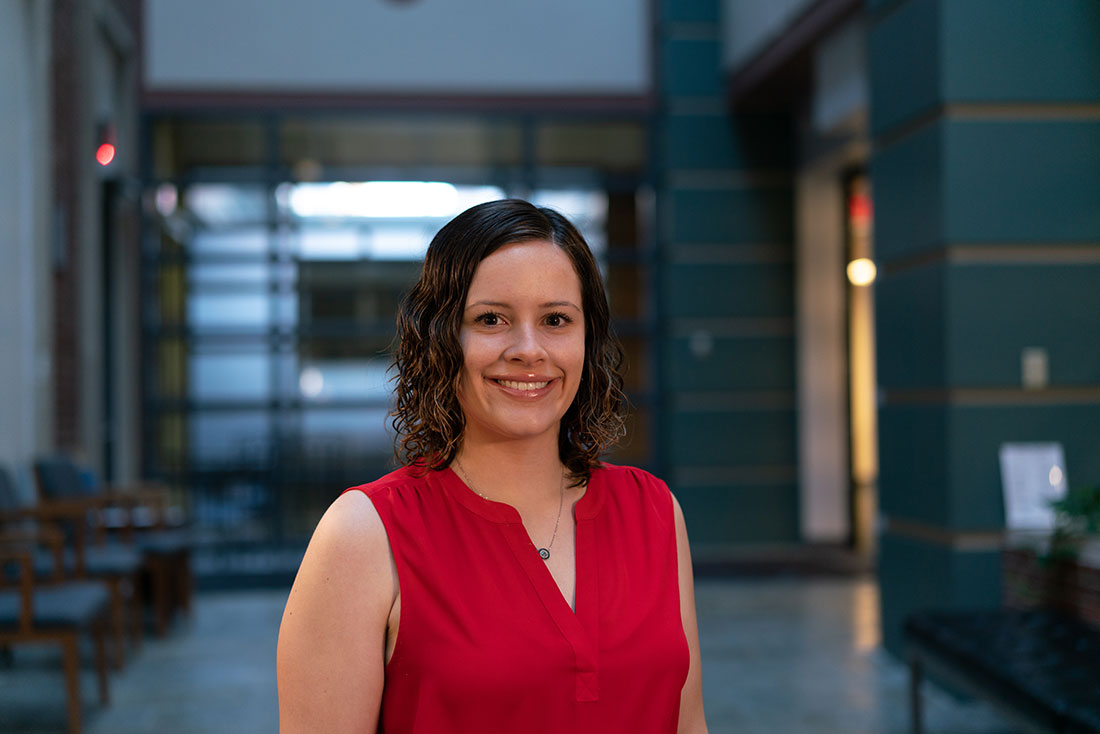
Mackenzie Mangos, Sport Analytics
The most influential experience has been my founding/serving as president of the Sport Analytics Women (SAW) Club. After my freshman year, I saw a need for this club – we only had three females in the entire major! Not only is this a problem in the program, but in the industry as well.
The club serves as a positive advocate for women in sport analytics. It is very rewarding to see the club making a difference and it allows the female underclassmen to have supportive upperclassmen to look up to, something I wish I had when I was a freshman. Syracuse University has helped me to grow as a person and as a leader.
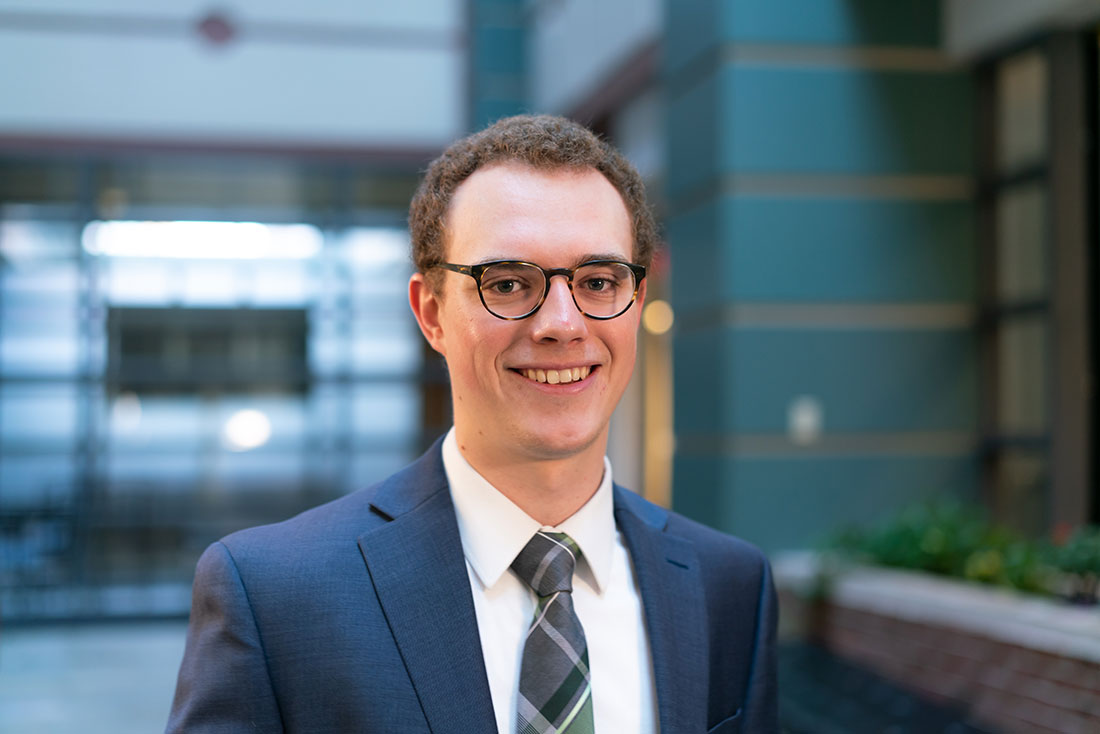
Nathan Redmond, Exercise Science
One of the most important experiences I have had at Syracuse University is the time I have spent with Syracuse University Ambulance (SUA). I became a member of SUA my freshman year and since then I have been responsible for providing emergency medical care to the Syracuse University campus and the surrounding communities. Within SUA I have held many positions, including mentor to the incoming members. I am responsible for teaching and training new members in the basic skills and assessment strategies necessary for their role on the ambulance.
SUA has been a place of support, community, family, loyalty, and genuine care during my tenure at Syracuse University. Additionally, I have worked as a crew chief, driver, trainer, and special event supervisor, which has been extremely impactful on my development as an EMS provider but more importantly helped to develop my leadership, teaching, personal growth, and public speaking skills. In general, SUA has reinforced my commitment and passion to becoming a physician.
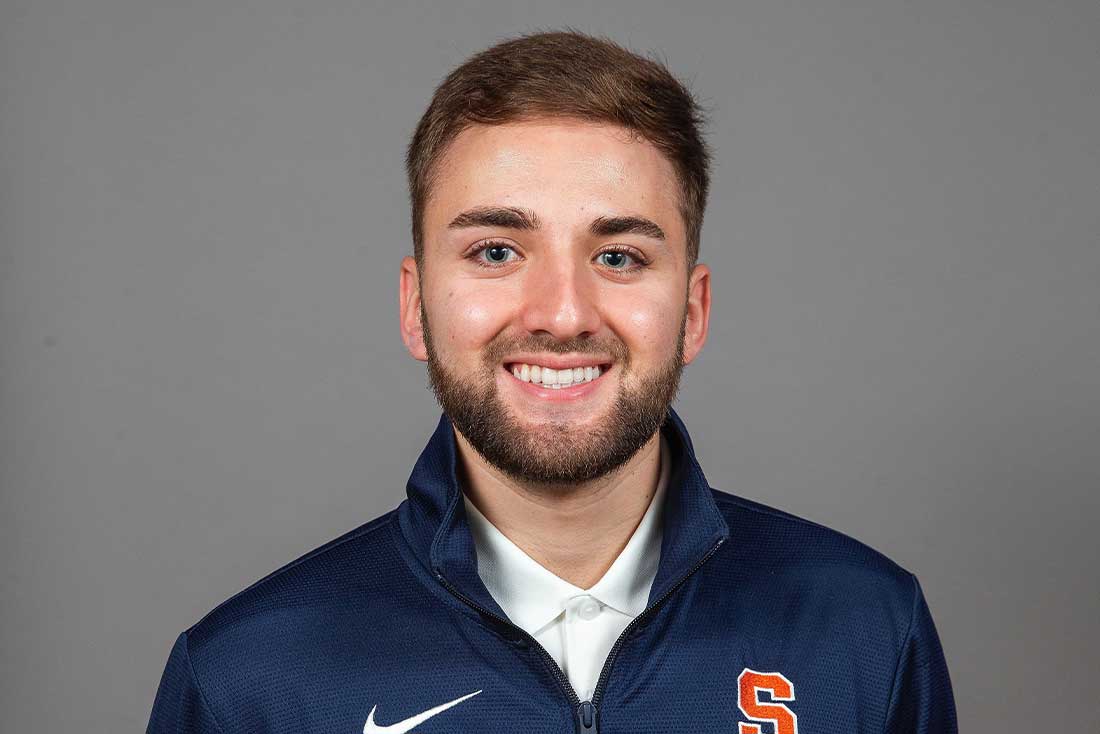
Dominic Samangy, Sport Analytics
Over the past four years at Syracuse, I’ve had the amazing opportunity to spend each one with the men’s basketball team as a student manager. Being able to work closely with Coach (Jim) Boeheim and his accomplished coaching staff has been an eye-opening experience and has certainly guided me in my development as a basketball professional.
I’ve also spent the past few years collaborating with my classmates and professors on research studies covering basketball and soccer topics. Through such efforts, I’ve had to opportunity to present work at prestigious conferences such as the MIT Sloan Sports Analytics Conference and Carnegie Mellon Sports Analytics Conference, and I’ll travel to London this May to represent SU and Falk College at the 8th Western Conference on Football and Finance. Outside of my time on campus, I’ve also utilized my Falk-driven skillset to serve as a consultant for NBA agencies over the past two NBA Draft classes. All in all, my time at Falk College at Syracuse University has not only prepared me for my future in sports but has provided a family and support system that I am truly grateful for.
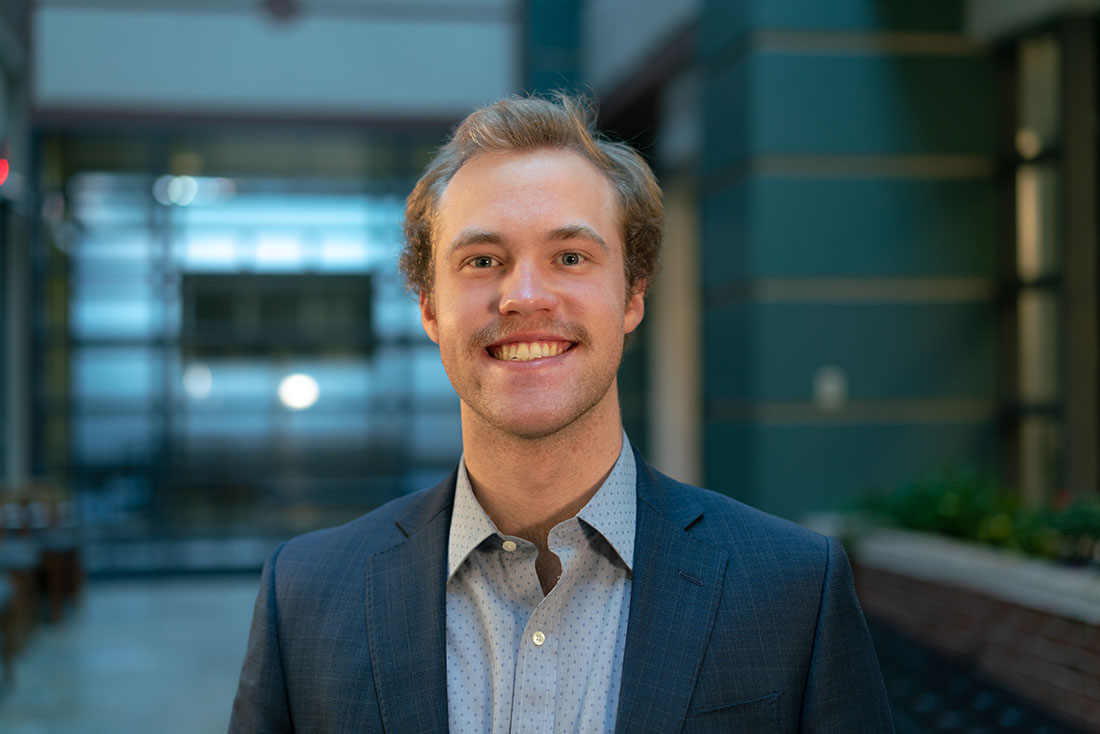
Cooper Shawver, Sport Analytics
The most important experience I had during my time at Syracuse University and Falk College was joining the Baseball Sabermetrics Club. The club inspired my desire to pursue both baseball competitions and research. For example, myself and four other students won the Arizona Sabermetrics Case Competition for our work researching pitchers’ effectiveness for the third time through a batting order.
Also, I am currently finishing my senior thesis on Major League Baseball player valuation. Despite all my experiences at Falk being memorable, the Baseball Sabermetrics Club had the greatest influence on my career at Syracuse University.
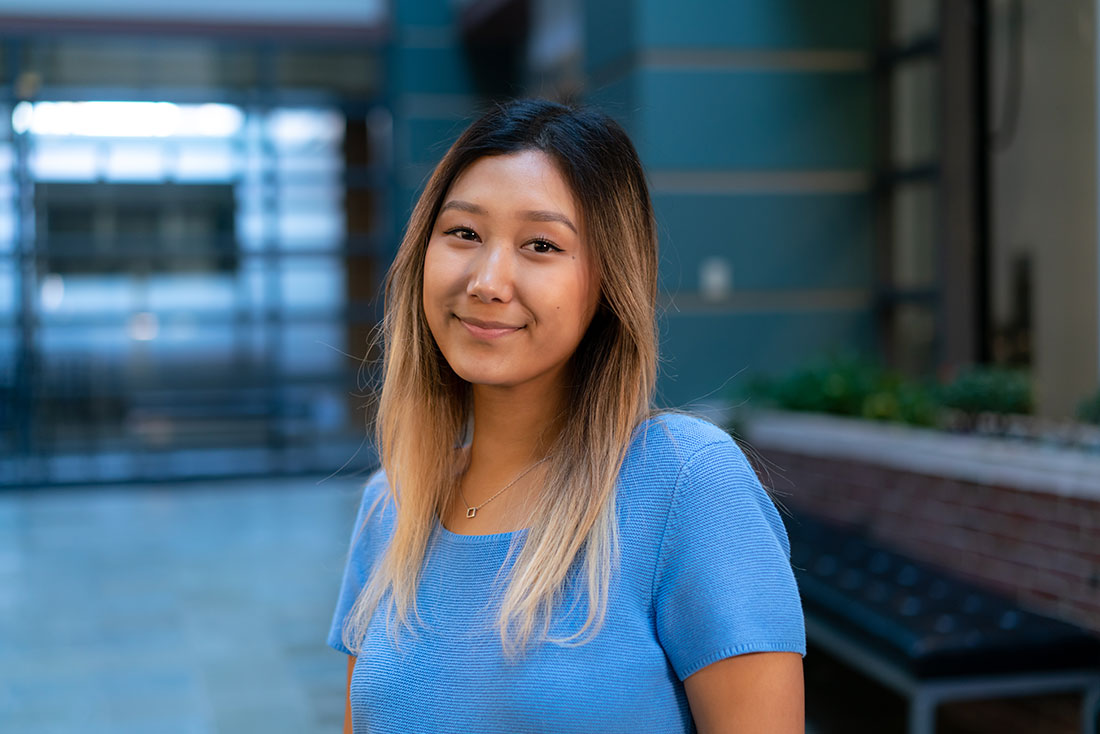
Choyang Lorane Sherpa, Social Work
Throughout my four years at Syracuse University, one of the most influential experiences was becoming involved in Kesem. Kesem is a student-led, nonprofit organization that provides a week-long, free summer camp, in addition to a year-long support system, for children affected by a parent or guardian’s cancer.
Joining this organization my freshman year has granted me the opportunity to grow and develop my skills as a leader. It has undoubtedly influenced who I am as a person, my career goals, friendships, and connections I have made with the community and the families in the Syracuse area.
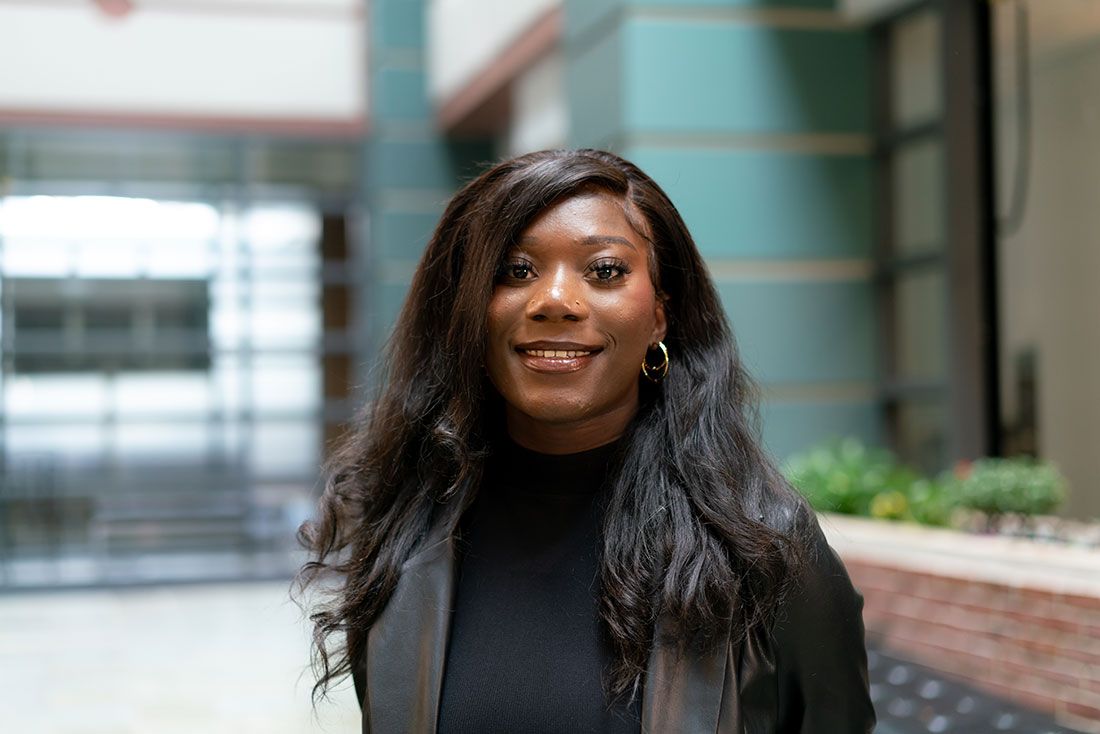
Dorbor Tarley, Human Development and Family Science
In my sophomore year, I began an independent research study under Dr. Matthew Mulvaney that explored bias against Black maternal patients. My research focused on investigating the interpersonal factors that might underlie the insensitivity toward Black women in medical spaces. My research experience has led to my involvement with SOURCE (Syracuse Office of Undergraduate Research and Creative Engagement) as a student research mentor, my involvement as a McNair scholar, and my current role as a peer health advocate at Planned Parenthood.
Given the significance of my research findings, I worked with the McNair Scholars Program and SOURCE to present my research locally and nationally. With my research, I was able to funnel my passions into a critically engaged study that might impact medicine’s understanding of the Black maternal health crisis. Overall, my experiences at Syracuse engaging in research and civic engagement developed into a passion for health equity. This passion catalyzed my desire to study public health and get my Master of Science in Public Health at Johns Hopkins Bloomberg School of Public Health.
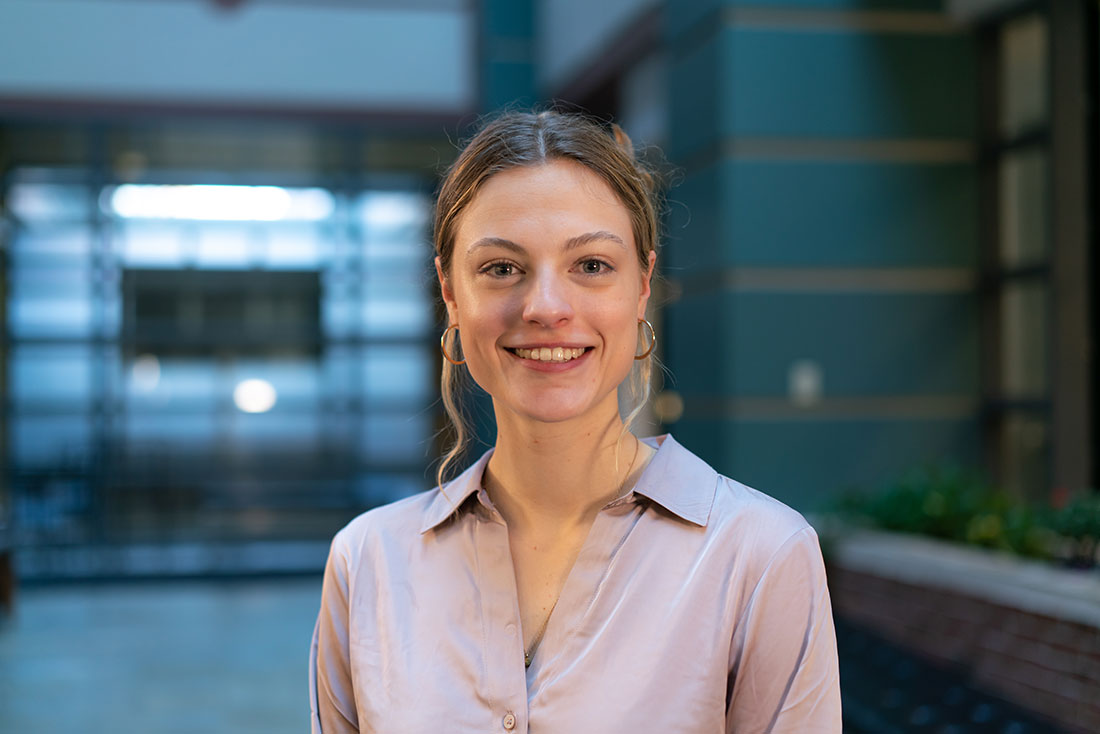
Olivia Templeton, Nutrition Science and Dietetics
The most important experience I have gained at Syracuse University was piloting my own research study analyzing how diet quality changes when converting from an omnivore (meat-eating) diet to a vegetarian diet. Through SOURCE (Syracuse Office of Undergraduate Research and Creative Engagement), I was able to receive grants to fund the research, which allowed participants to visit the ACE Center (Nutrition Assessment, Consultation and Education) within Falk College for lab visits. Participating in research was one of the reasons I chose to attend Syracuse University, and I am grateful this came to fruition.
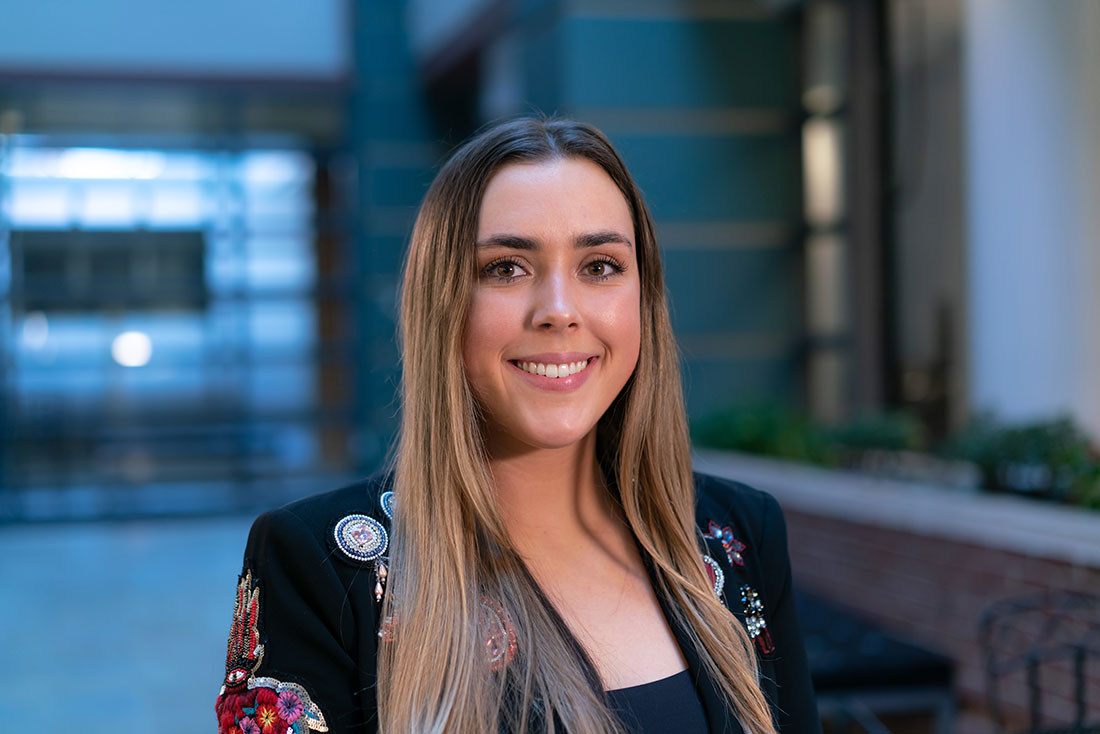
Cathryn Willing, Public Health
As a first-year public health student, I enrolled in the Healthy You Practicum course taught by Dr. Luvenia Cowart. I quickly came to love writing and talking about health issues and found the formula and publication process extremely interesting. After my first semester, in which I was published twice, I reached out to Dr. Cowart to see if I could continue writing for the magazine and the following summer, Dr. Cowart reached out to me asking if I would be interested in a copy editor position.
I attribute much of my successes to the magazine and Dr. Cowart. She trusted me to lead the program, which naturally helped me grow as writer and editor. In my last few semesters working with the magazine, we expanded the magazine’s production team and I was promoted to managing editor. I wrote an article about a new–at the time–faculty member, Dr. Bernard Appiah, and we later became colleagues on a research project funded by SOURCE (Syracuse Office of Undergraduate Research and Creative Engagement). I truly think of Falk College and my public health experience in terms of the magazine and the five publications I was able to oversee from an editorial position. Given the freedom to expand my creativity through writing, editing, and leading is something I will forever be grateful for.
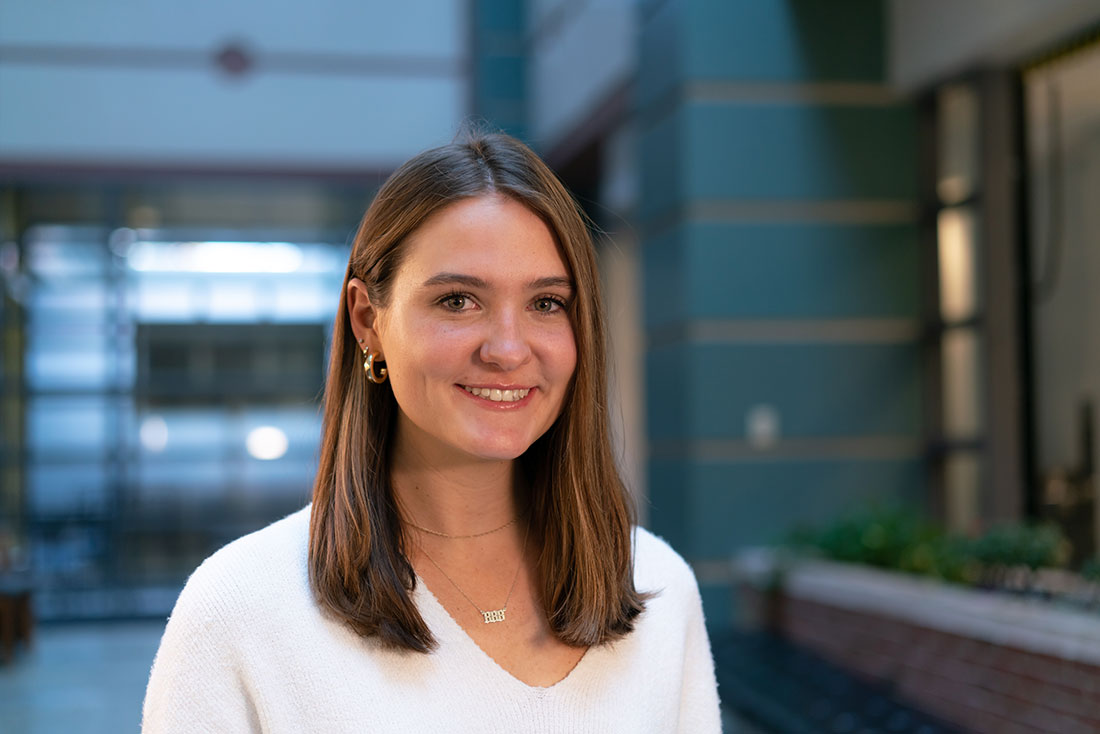
Megan Willkens, Public Health
The most rewarding experience throughout my time at Falk College was becoming involved with undergraduate research. In collaboration with Dr. David Larsen, I completed a project assessing the association between indoor residual spray for malaria control and child cognitive development in sub-Saharan Africa.
This research led to other opportunities, including my contribution to conduct a survey that assessed the capacity of New York State wastewater treatment plants to support wastewater surveillance for COVID-19, and data analysis with the New York State Health Department to expand the NYS wastewater surveillance program. In combination, these experiences have allowed me to develop skills in research and grow personally and professionally.
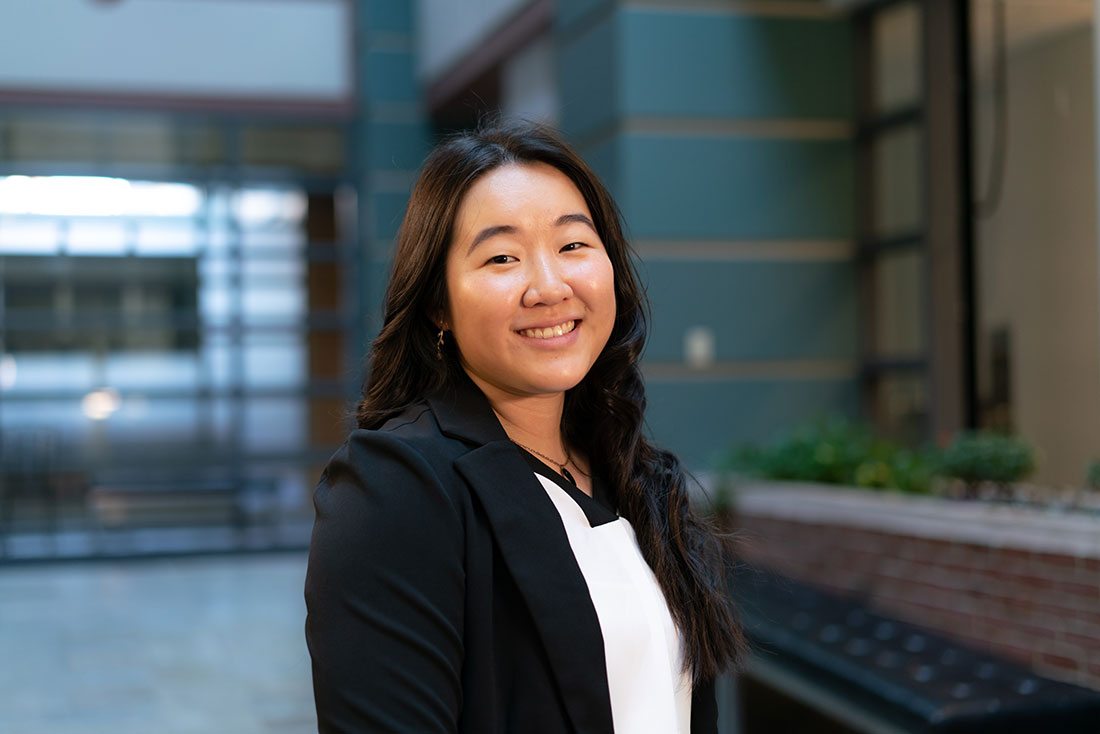
Sewina Yu, Exercise Science
It is difficult to choose just one experience that has been the most important or impactful on me. However, being in Dr. Joon Young Kim’s Clinical Research Lab in the Department of Exercise Science has taught me invaluable analytical and research skills. I was able to present two research critiques at an international conference, submit a proposal for an undergraduate SOURCE (Syracuse Office of Undergraduate Research and Creative Engagement) grant, learn about IRB (Institutional Review Board) approval, and submit a poster for Falk Research Day.
I am so grateful to have had these opportunities and experiences in Dr. Kim’s lab. Along with this experience, working at the Barnes Center as a personal trainer has also helped me apply what I have learned in my exercise science classes to guide clients toward their fitness and health goals. These two experiences taught me skills that will undoubtedly help me succeed at physical therapy school.
Honored by the Academy of Nutrition and Dietetics
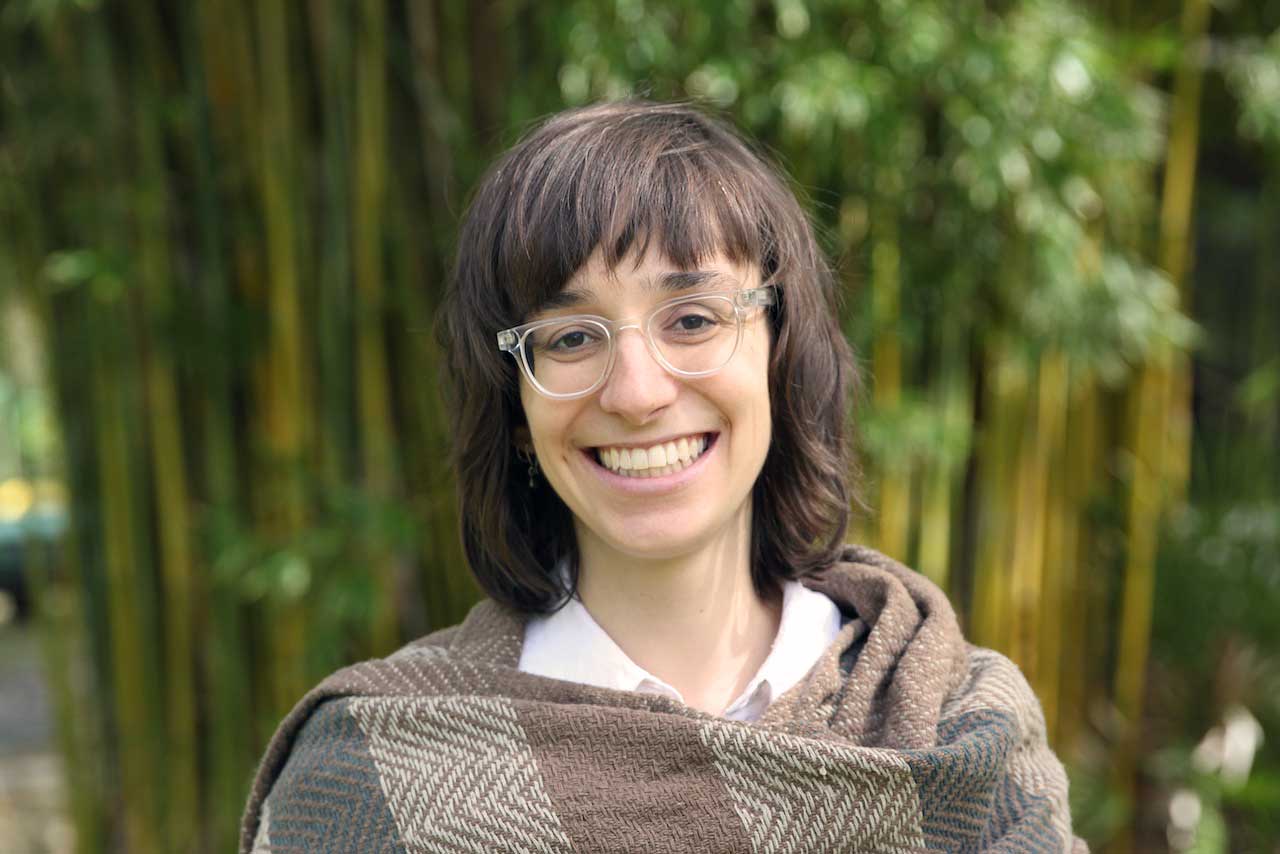
Garofano is actively engaged in research and service with various professional and community organizations. We spoke with Garofano to learn more about her research experience and interest in nutrition:
Tell us a little bit about yourself:
I am from Syracuse, left at age 18, and returned after about 10 years to care for and be with my mom, who passed away from colorectal cancer in 2018. Outside of being a student, I’m a mom of two young kids, an avid doodler, an aspiring gardener, a decent cook but better eater, and a recent convert to graphic novels.
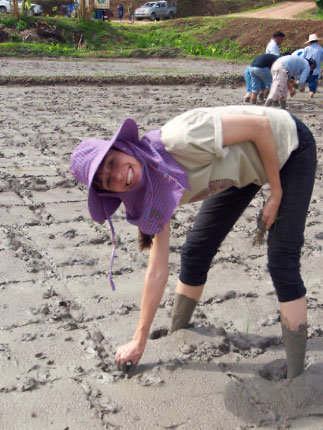
What sparked your interest in nutrition?
During my time away (from Syracuse) I had the opportunity to learn about agriculture, including working internationally for a nonprofit that does agriculture research and extension for smallholder farmers.
There were multiple culminating dynamics that contributed to this moment, but the specific one when I realized that I wanted to study nutrition science came while working on a research grant, which involved doing nutrition composition analysis of local vegetable species for which that data doesn’t yet exist. We were packing fern samples to ship to the World Vegetable Center office located at Kasetsart University in Bangkok, Thailand. My co-workers taught me a lot about food, and collecting and packing these samples, of course, involved taste testing the fern in several dishes that they enjoyed.
Something clicked for me in that moment, and I realized I wanted to study nutrition science because it’s in the kitchen that people and communities express their values, their love for each other, and address issues or concerns that they face (whether in the agriculture field, politically, culturally, or as it relates to health issues). I knew that studying nutrition science would help me understand how agriculture connected to human metabolism. This whole experience was reinforced and deepened when I was caring for my mom, who worked as a family consumer science teacher here in Central New York.
What made you choose SU’s nutrition program?
When I returned to Syracuse, I was so grateful to come “home,” to be by family, and to get to know this community that raised me in a new way. It was important for me to study here, and to do so at Syracuse University has been an opportunity and a privilege I value. It’s been nice that the Nutrition Science program is housed within the same department as the Food Studies program. That cross pollination between the programs, for me, has been very important.
Tell us about your thesis:
My research focuses on the application of integrated measures between agriculture and nutrition, and specifically looks at the somewhat novel metric referred to as “nutrition functional diversity,” using principles of ecological diversity that assess a growing space not just according to the number of species within that space, but also according to the functions or niche role that each species fills. In this case, it’s an opportunity to consider a growing plot (like a home garden) and evaluate the ways that those plants work synergistically, and what potential arrangement of macro or micronutrients they provide to the human who consumes them.
I think one way to describe the question I’ve been considering is the concept of “nutrition resiliency.” While I, of course, bring biases and assumptions to the research on multiple levels, I am compelled by the potential of considering innovation that happens in gardens, fields, and kitchens, and asking how those decisions reflect ingenuity and creativity, and how then that ingenuity is reflected in the complex processes of human metabolism.
Where did this research idea come from?
My research project was very much influenced by the work of Andrea Guzmán-Abril and Stephen Alajajian at the Mayan Health Alliance. I’ve been very grateful to partner with a nonprofit pantry garden based in Immokalee, Florida. Immokalee grows about 90% of U.S. wintertime tomatoes. Some people may be familiar with the unincorporated town because of important human rights and labor organizing work of groups like the Coalition for Immokalee Workers.
As (Falk professor) Laura-Ann Minkoff-Zern so aptly points out in her research, immigrant farmworkers that provide undervalued labor in U.S. agricultural fields are doubly ostracized within emergency food systems, including by way of failing to acknowledge their rich (nutritious) food traditions and the expertise of their agrarian backgrounds. While many farmworkers have difficulty accessing growing spaces because of restrictions that landlords place on their rental spaces, many still garden in containers.
This research project looks at the biodiversity around Immokalee community members’ homes and considers the correlation with dietary data. It also considers the ways that access to “preferred” fruits and vegetables (through pantries, foraging, purchase, or exchange) impacts their diets. One of the research partners, Lupita Vazquez, continues to ask the question of how this research can tangibly support the community that it’s gathering data from. I’ll continue to learn from her and the other people who’ve led the interviews about how best to offer this data to the community there.
Tell us about your mentorship experience at Falk. Has there been a particular person or office that has supported your work?
Faculty mentorship has most definitely been the most valuable part of my studies. Dr. (Lynn) Brann, Dr. (Sudha) Raj and Dr. (Margaret) Voss have all been very supportive and encouraging of me. All three have written countless letters on my behalf and acted as a sounding board for my harebrained ideas!
Dr. Voss as a mentor and thesis advisor has been invaluable. I feel very lucky to have found an ecologist and physiologist within the nutrition science department to guide my learning. She has allowed me the space to grow and has provided the resources and expertise along the way. I didn’t expect to have such a positive an edifying experience with primary research during a master’s program, and her commitment and support have largely made that possible. It’s evident that she cares deeply for her students. While I haven’t experienced other graduate programs or universities, I think the freedom and support I’ve received during my time at Falk College is somewhat unique.
I’ve also been very grateful for exposure to faculty within the Food Studies program. I mentioned Laura-Ann Minkoff-Zern’s work earlier. Estelí Jimenez-Soto has recently joined the department and has been very gracious in including me in research groups along the way.
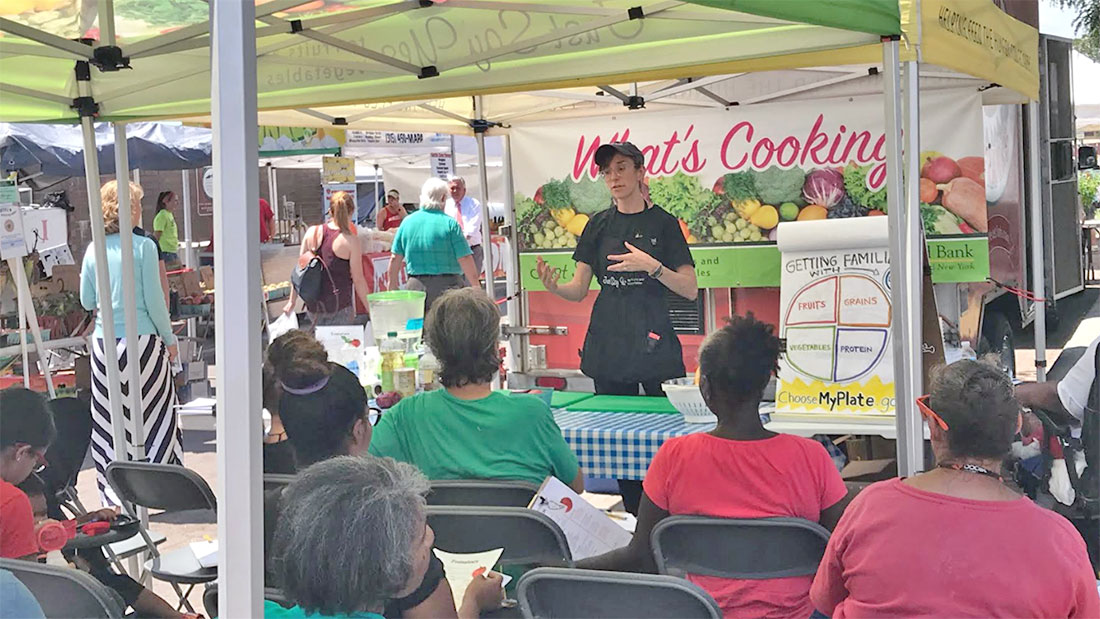
Other than what we’ve discussed, what has been your favorite experience at SU?
Growing up in Syracuse, I didn’t spend much time on SU’s campus. I’ve really enjoyed getting to know this city through the lens and work of professors that call it home. Jonell Robinson (geography), Sandra Lane (public health) and the late Evan Weissman (food studies) are faculty members that stick out to me. Their work is rooted in justice and this community in a way that I am inspired by; as I’ve moved about the city, I realize now that I bump up against it, from time to time, without realizing it. One such place is within the Syracuse Onondaga Food Systems Alliance.
What is the most important thing you hope to accomplish in your career long after SU?
To be honest, I think relationships are the biggest motivating factor in my life. I want to become a registered dietitian, possibly start my career by working in clinical oncology, live and work in Syracuse, and be an engaged community member. Aside from that I hope I can improve the biodiversity of my little yard, get to know Onondaga Lake better, and maybe develop a personal (or collaborative) graphic medicine project that is focused on food and nutrition.
Learn more information about Nutrition and Food Studies at Syracuse University’s Falk College, or learn more about ongoing research at Falk.
And the Winners Are…
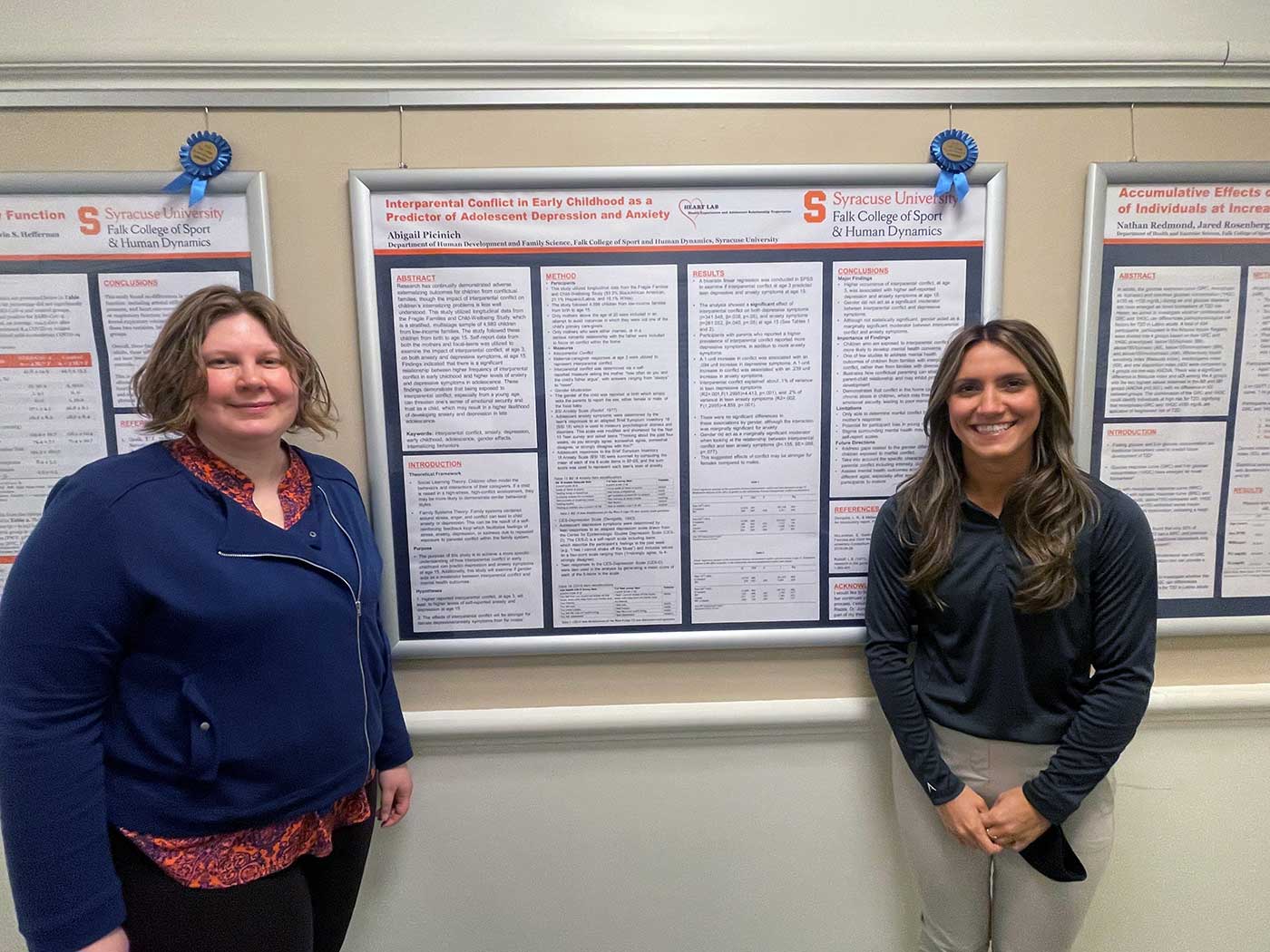
With a record 66 poster submissions, picking the winners of the sixth annual Falk Student Research Celebration was more difficult than ever.
“I have to thank the (Research Celebration) committee–that was a tough job to decide,” says Sara Vasilenko, the committee chair and an assistant professor in the Department of Human Development and Family Science. “The incredible participation shows the vitality of the research that’s being done at Falk.”
Held virtually March 29, the Research Celebration highlighted students’ research collaborations with their faculty mentors. Undergraduate, master’s and doctoral students who are enrolled in a Falk degree, minor or CAS (Certificate of Advanced Study) submitted electronic posters of completed or in-progress empirical, exploratory, policy analytic, systematic review, or hypothesis-driving research projects using qualitative, quantitative, or mixed methods for display.
The committee selected nine winners – three each in the undergraduate, graduate and doctoral categories (the winners are listed at the end of this story). Kathryn Gratien, research operations specialist in the Falk College Research Center and a member of the Research Celebration committee, says the winning posters are displayed on the third floor of White Hall in the Falk Complex, across from the Research Center (Room 344).
“Congratulations to all the students and faculty mentors for an outstanding virtual display of research projects,” Gratien says. “We are so excited that the interest and participation in the Falk Student Research Celebration keeps growing each year and thank you to all the students and their mentors for their hard work and high-quality poster submissions.”
The posters were judged by the Research Celebration committee, which is comprised of faculty and staff. Faculty mentors who are on the committee did not participate in rating their students’ posters.
“I want to thank all of the faculty members who were involved in mentoring the students,” Vasilenko says. “There’s so much great research happening at Falk involving students, and that’s something the faculty should be really proud of.”
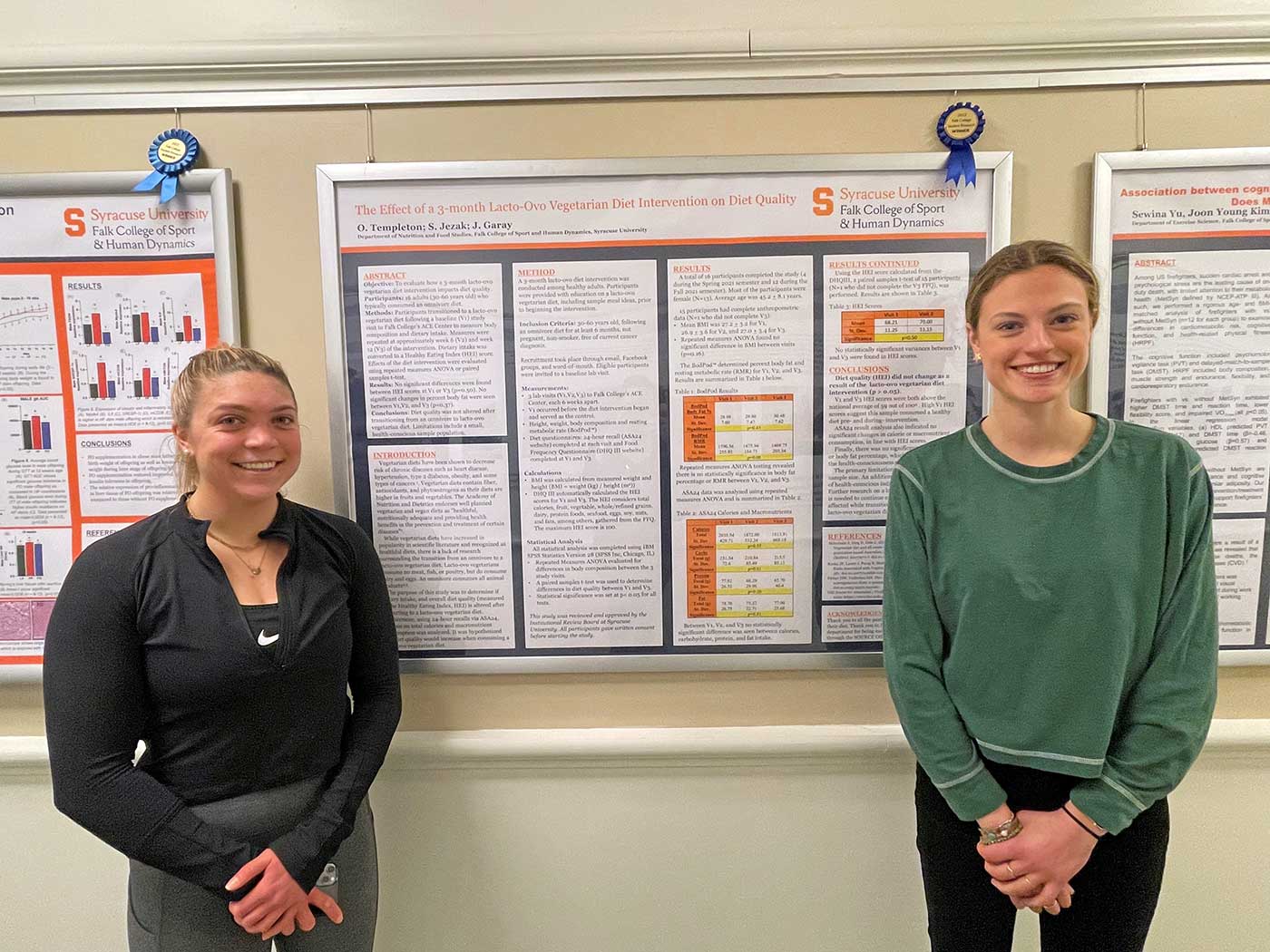
2022 Falk Research Celebration Winners
Undergraduate Student Poster Winners
Accumulative Effects of Novel Biomarkers on Identification of Individuals at Increased Risk for Type 2 Diabetes (T2D)
Names: Nathan Redmond, Jared Rosenberg and Professor Joon Young Kim
Program/Major: Health and Exercise Science
Faculty Research Mentor: Professor Joon Young Kim
The Effect of a 3-month Lacto-Ovo Vegetarian Diet Intervention on Diet Quality
Names: Olivia Templeton and Samantha Jezak
Program/Major: Nutrition Science
Faculty Research Mentor: Professor Jessica Garay
Association between Cognitive Function and Metabolic Syndrome in US Firefighters: Does Metabolic Syndrome (MetSyn) Matter?
Names: Sewina Yu, Professor Joon Young Kim and Myong-Won Seo
Program/Major: Health & Exercise Science
Faculty Research Mentor: Professor Joon Young Kim
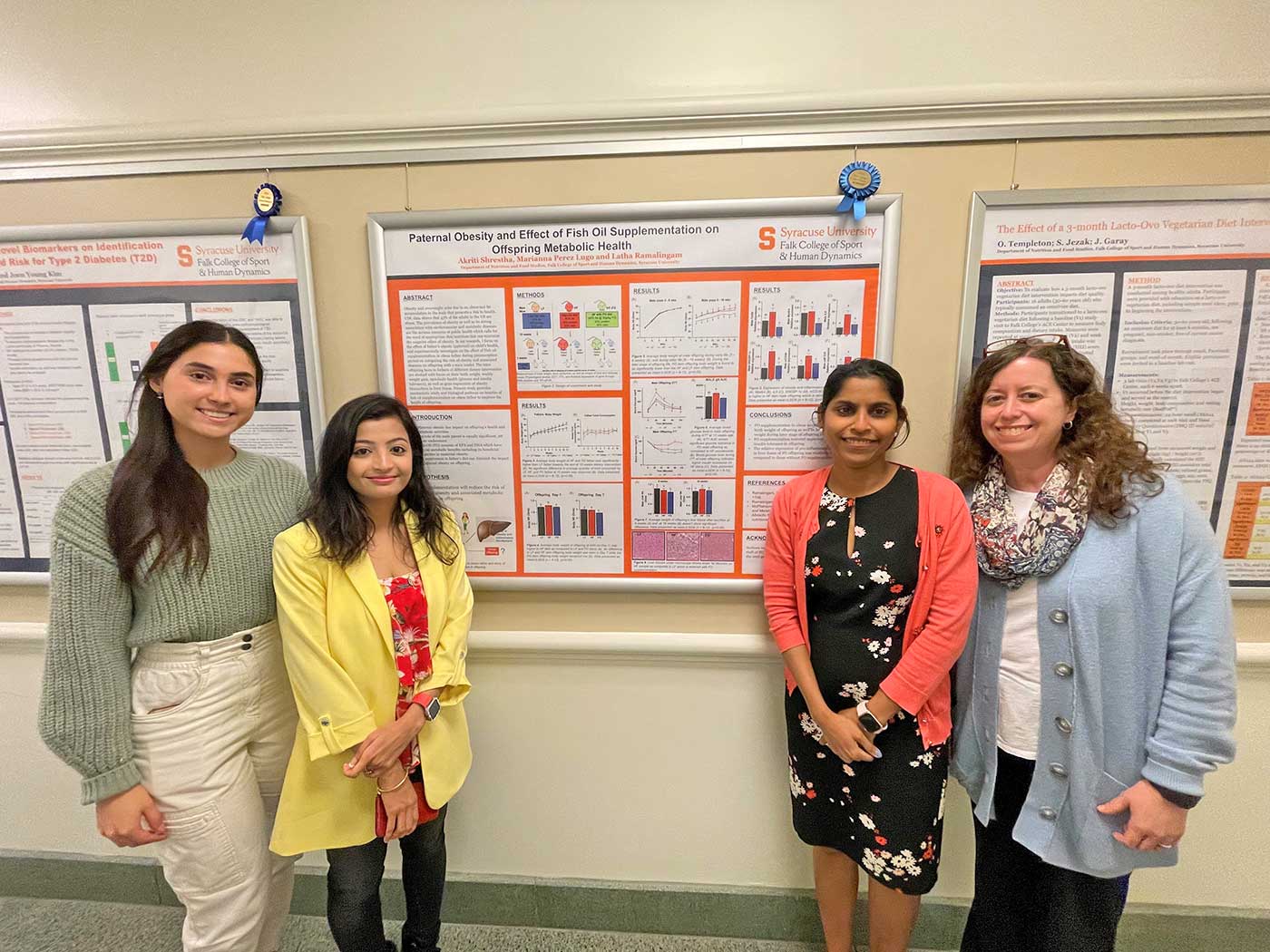
Graduate Student Poster Winners
Risks and Protective Factors for Veterans’ PTSD, Mental Well-being, and Substance use During the COVID-19 Pandemic
Names: Jacqueline Allen, Professor Xiafei Wang and Professor Ken Marfilius
Program/Major: Social Work
Faculty Research Mentor: Professor Ken Marfilius
Interparental Conflict in Early Childhood as a Predictor of Adolescent Depression and Anxiety
Name: Abigail Picinich
Program/Major: Human Development and Family Studies
Faculty Research Mentor: Professor Sara Vasilenko
Paternal Obesity and Effect of Fish Oil Supplementation on Offspring Metabolic Health
Names: Akriti Shrestha, Mariana Perez Lugo and Professor Latha Ramalingam
Program/Major: Nutrition Science
Faculty Research Mentor: Professor Latha Ramalingam
Doctoral Student Poster Winners
Cardiac Autonomic Modulation in Healthy Young Adults With and Without History of COVID-19
Names: Burak Cilhoroz, Sydney Brackett, Leah Rozumov, Sophia Luchs, Zachary Greely and Professor Kevin Heffernan
Program/Major: Exercise Science
Faculty Research Mentor: Professor Kevin Heffernan
Examining Cardiometabolic Disease Risk in Normal Weight (NW) and Overweight/Obese (OB) Individuals: Results from 2017-2020 NHANES
Names: Lindsey Clark, Myong-Won Seo and Professor Joon Young Kim
Program/Major: Exercise Science
Faculty Research Mentor: Professor Joon Young Kim
The Effect of SARS-CoV-2 Infection on Cardiorespiratory Function
Names: Andrew Heckel, Danielle Arcidiacono, Kailee Coonan, Jacob DeBlois, Alaina Glasgow and Professor Kevin Heffernan
Program/Major: Exercise Science
Faculty Research Mentor: Professor Kevin Heffernan
About the Falk College Research Center
The Falk College Research Center promotes a robust, collaborative research community in which students play an active role. At Falk, graduate and undergraduate students have the opportunity to work directly with faculty to collect data, analyze findings and draw conclusions on relevant topics surrounding public health, food studies, nutrition, sport management, human development and family science, social work, exercise science, and marriage and family therapy.
Falk Hosts Sports Nutrition Expert
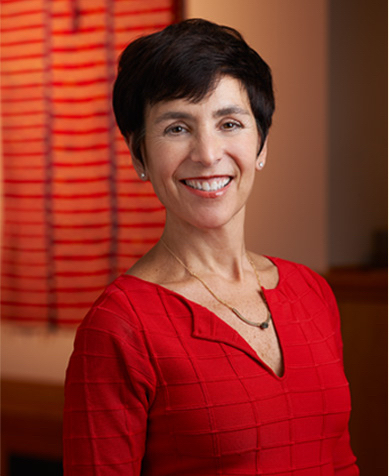
Nationally known sports nutrition expert Leslie J. Bonci will present “Fuels of Engagement: Nutrition Trends That Should Stay and End” at 6:30 p.m. Thursday, April 14, in Grant Auditorium at the Falk College complex.
Bonci is the featured speaker of the sixth annual Ann Selkowitz Litt Distinguished Speaker Series. The lecture is free and open to the public, and light refreshments will be served at 5:30 p.m.
“I am so honored and excited to speak at Syracuse University and honor the legacy and memory of a colleague, a pioneer and a wonderful sports registered dietician, Ann Litt,” Bonci says. “My topic is ‘Fuels of Engagement,’ which will focus on how to strategize, optimize and realize goals through food choices and eating habits activation.
“How can we tune out the misinformation, create order out of chaos, eat within our means and make progress without unintended consequences?” Bonci adds. “Individualization with food choices should nurture, empower, enable and complement lifestyle, health, and well-being in an affordable, available, accessible and actionable manner.”
Bonci, MPH, RD, CSSD, LDN, is the owner of Active Eating Advice, a nutrition consulting company, and co-founder of Performance 365, a sports nutrition consulting company. Her clients include the National Dairy Council, California Dried Plum Board, Bayer USA, Produce for Better Health Foundation, National Peanut Board, Gatorade, GoodSport, Ready Nutrition, General Mills and KLEAN Athlete.
She is currently the nutrition consultant for the 2020 Super Bowl champion Kansas City Chiefs and the Fan Controlled Football (FCF) indoor league. She was previously the company nutritionist for Pittsburgh Ballet Theatre and sports dietitian for Carnegie Mellon University athletics and the WNBA, NFL’s Pittsburgh Steelers, NHL’s Pittsburgh Penguins, and Major League Baseball’s Pittsburgh Pirates, Toronto Blue Jays and 2019 World Series champion Washington Nationals.
To get a sense of Bonci’s presentation April 14, watch these videos on the Active Eating Advice website to observe Bonci working with athletes to help them be their best, mentoring children to help them cultivate and create an atmosphere of food appreciation, and communicating general wellness strategies around fueling for activity.
Bonci received a Bachelor of Science degree in biopsychology from Vassar College and a Master of Public Health degree in nutritional epidemiology from the University of Pittsburgh. The author of several popular fitness and nutrition books, Bonci is a regular blogger for U.S. News & World Report’s Eat + Run webpage and hosts weekly television and radio segments for KDKA television and radio in Pittsburgh.
A sought-after national and international speaker, Bonci is an advocate for programs that address food and nutrition insecurity, and an advocate for agricultural biotechnology and sustainability. She is a firm believer in evidence-based practice over sensationalism and incorporates equity, diversity and relevance into her presentations and practice.
Here are the details:
What: Sixth annual Ann Selkowitz Litt Distinguished Speaker Series.
When: 6:30 p.m. Thursday, April 14 (light refreshments at 5:30 p.m.).
Where: Grant Auditorium in the Falk College complex at Syracuse University (campus map).
Who: Sports nutrition expert Leslie J. Bonci will present “Fuels of Engagement: Nutrition Trends That Should Stay and End.”
Parking: Free parking is available in the Stadium Lot off Raynor Avenue. (Directions to Stadium Lot).
For more information and accommodations requests, please contact Annette Hodgens at ahodgens@syr.edu or 315.443.9816.
About the Ann Selkowitz Litt Distinguished Speaker Series
Ann Selkowitz Litt ’75 (1953-2007) was a nationally known nutritionist who helped children and adolescents with eating disorders and assisted developing athletes in reaching their full potential. The nutrition consultant to CosmoGirl magazine, Litt was the author of The College Students’ Guide to Eating Well on Campus, Fuel for Young Athletes, and the American Dietetic Association Guide to Private Practice. She was the nutritionist for the NFL’s Washington Redskins and served as spokesperson for several media campaigns during her career, including the Got Milk campaign. After her death, the Ann S. Litt Foundation, Inc., was created to support nutrition education. Through a generous gift from this foundation to Falk College, the Ann Selkowitz Litt Distinguished Speaker Series was created at Syracuse University in 2015.
A Nourishing Alliance
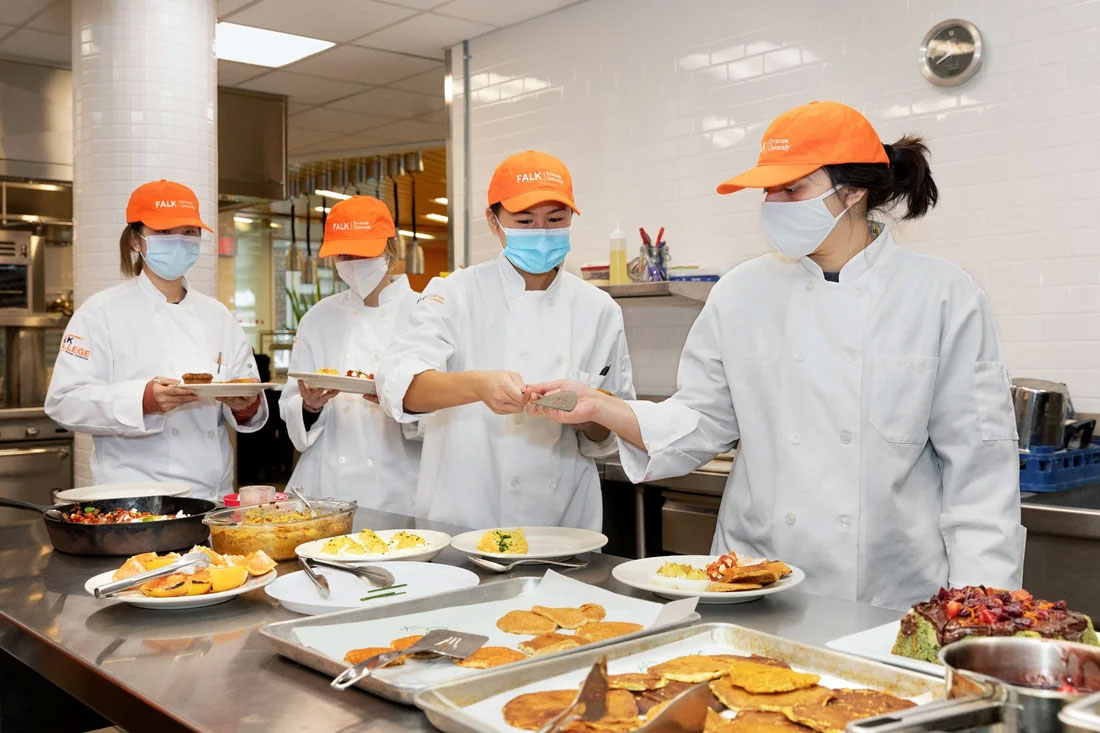
Natalie Antosh was a third-year student at Upstate Medical University in 2019 when she noticed a gap in the medical school curriculum—there was little nutrition content. Acutely aware of the role nutrition plays in many diseases, she decided to survey her fellow medical students and found that the majority wanted more nutrition instruction. Ninety-five percent said they would welcome an elective nutrition course.
Antosh teamed up with Dr. Barbara Feuerstein, a professor of medicine at Upstate and an endocrinologist at the Joslin Diabetes Center, and Dr. Beth Nelson, a professor of pediatrics at Upstate, to brainstorm about creating a nutrition course. Nelson had completed a master’s degree in nutrition at Syracuse University’s Falk College prior to attending medical school and knew that the Falk faculty expertise was just what they needed. They reached out to professors Kay Stearns Bruening and Sudha Raj in Falk’s Department of Nutrition and Food Studies and began designing a nutrition course for fall 2019.
Within hours of announcing the addition of a new elective called Food as Medicine, the class was filled.
Developing a Curriculum
Bruening, director of Falk’s Nutrition Assessment, Consultation and Education Center, was asked to provide an introduction and an overview for the course, as well as a session on fad diets. “I taught it as a session on the world’s healthiest diets and what they have in common, and then organized a presentation of whole foods by food group with an emphasis on their clinical medical implications,” she recalls.
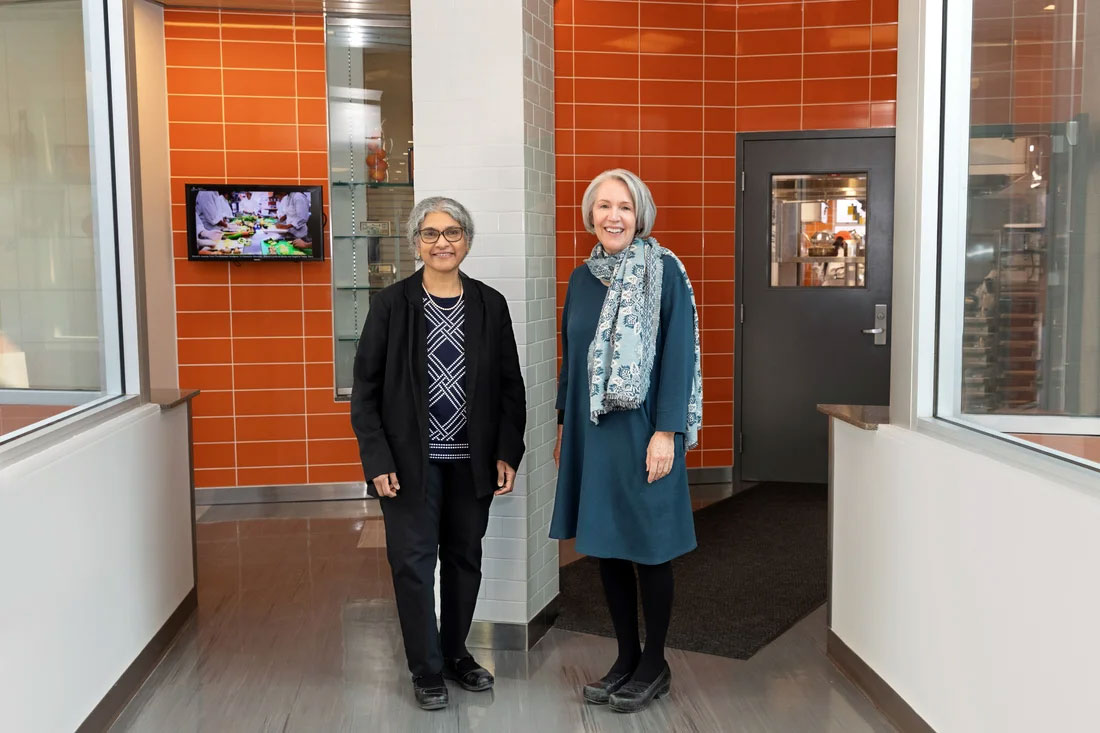
Bruening notes that the Food as Medicine course content is different from what she uses in her Falk clinical courses. “My Falk courses include content on the pathophysiology of diseases, how it affects nutrition status and the nutrition care process,” she says. “Medical students would already know the pathophysiology, and their approach to assessing patients is different from the approach of nutrition professionals.”
Feuerstein points out that medical students will go into many different specialties, so they have a variety of reasons to take the course. “Beyond professional applications, I think some students also found the nutrition class helpful for their own lives—one assignment on taking a nutrition history from a family member had some enlightening surprises for many students.” And the course provides a variety of experiences that are especially valuable for expanding medical students’ perspectives. “Shadowing an Overeaters Anonymous session, sitting in with various dietitians and creating a cookbook are great learning experiences for our medical students,” she says.
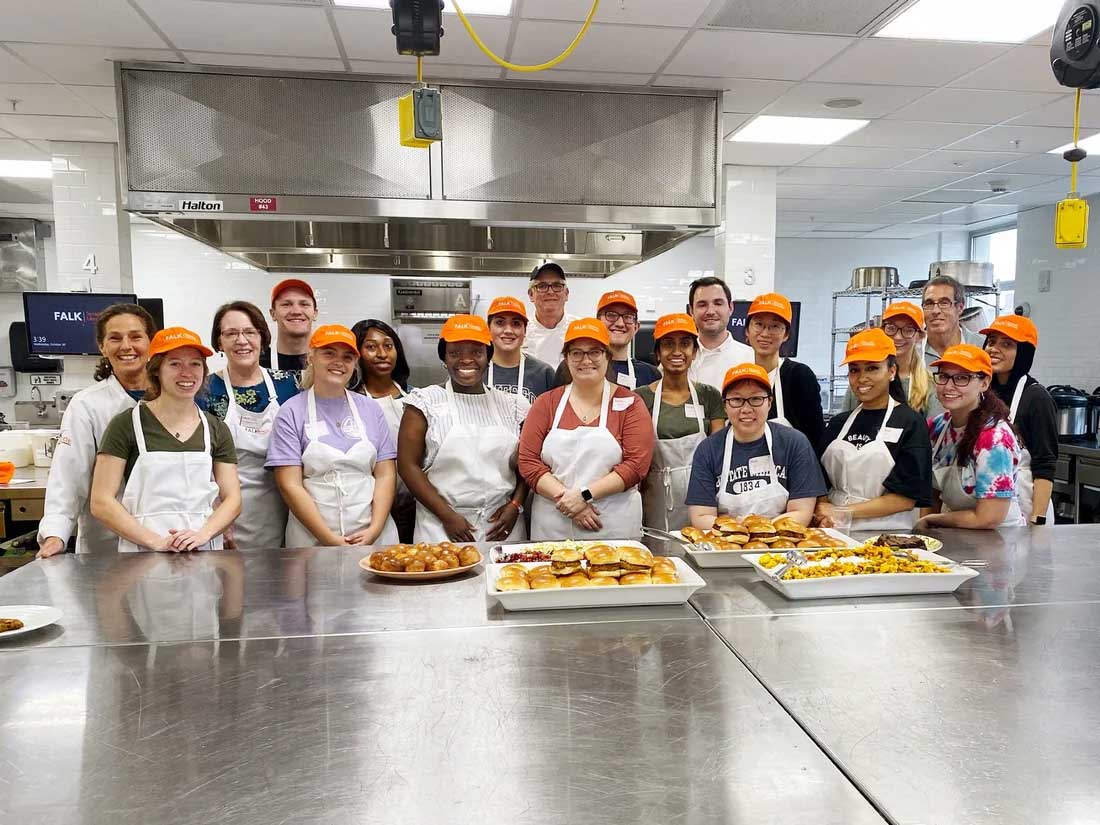
Raj, who directs Falk’s graduate programs in nutrition science as well as the new online Certificate of Advanced Study (CAS) in Integrative and Functional Nutrition, developed a module on functional nutrition for the course. “We teach medical students a systems biology approach to integrate diet, genetics and lifestyle to address underlying causes of chronic disease,” she says. Additional modules addressed obesity, diabetes, cardiovascular disease, pregnancy, pediatrics, oncology and cancer prevention, and vegetarian diets.
Building Bridges
Raj believes the course builds a bridge between medicine and nutrition that benefits the entire community. “The alliance between Falk and Upstate provides a seat at the table for the nutrition professional along with medical and allied health professionals,” she says. “We’re fostering a health care climate where nutrition is seen as part of the health care paradigm—not a separate entity—and emphasizes a partnership between patient, physician and the nutrition professional for sustained long-term health.”
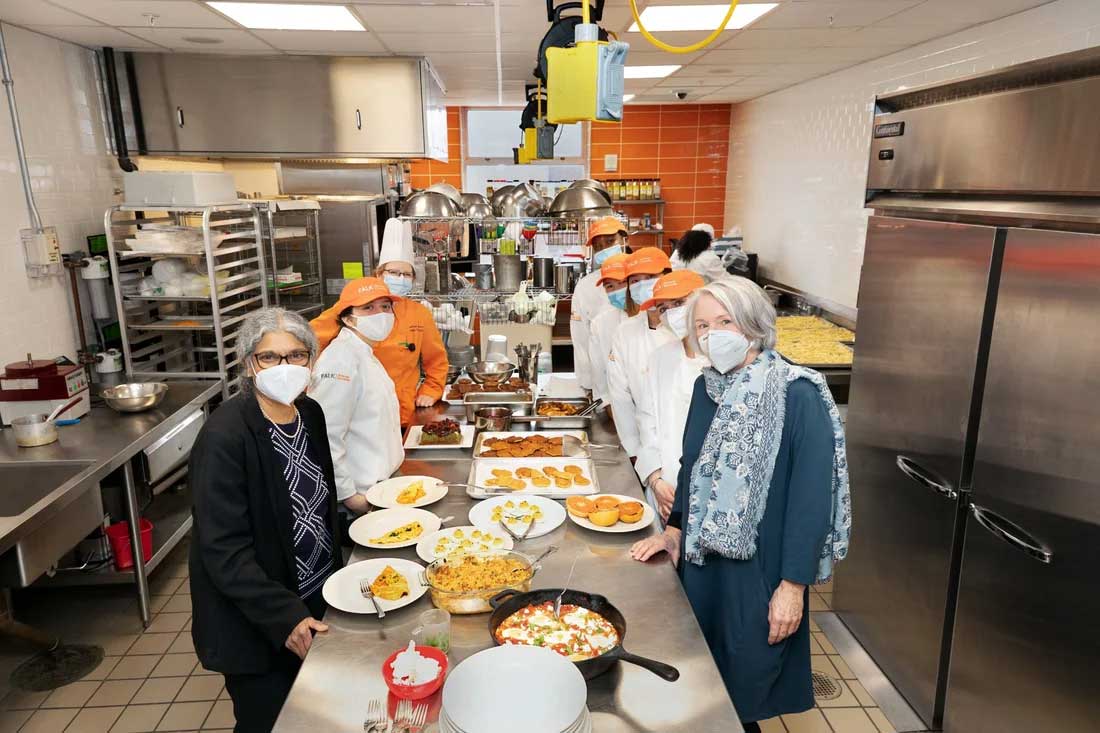
The collaboration also reinforces Syracuse University’s commitment to experiential learning and community service, and it has created valuable opportunities for students from both institutions. “For the past two years I’ve taken part in an interdisciplinary education initiative with a colleague who teaches in the Respiratory Therapy program at Upstate,” says Bruening. “This year, I led a lecture and workshop on nutrition and respiratory function for her respiratory therapy students. She, in turn, took small groups of Falk students from my Medical Nutrition Therapy class to her teaching lab at Upstate, where they learned about respiratory interventions and intubated a mannequin. The nutrition science students loved it, and the dietetics students learned firsthand how respiratory interventions that keep patients alive can affect their ability to obtain adequate nutrition.”
Community partners like Brady Farm and the University United Methodist Church food pantry provide guest speakers and field trip opportunities for students, and Food Bank of Central New York offers sessions with local nutritionists and registered dietitians. One was led by Falk nutrition alumnus Deb Mimaroglu ’14 and another by Heather Brubaker G’18, who focused on how trauma can affect interactions with participants in nutrition education and counseling sessions.
A popular feature of the course is Culinary Medicine Day, when students create and taste healthy, plant-forward dishes. It was originally held in the Falk teaching kitchens with the help of Falk culinary specialist Bill Collins, but in 2020 pandemic restrictions inspired Bruening to switch to a live virtual presentation from her home kitchen. It was so flexible and cost effective they decided to conduct the 2021 event virtually again, this time in Feuerstein’s home kitchen.
Enriching Falk Students
Raj says teaching has been her passion since high school. “I see teaching as a two-way street where I share my knowledge and at the same time I learn from my students, peers and colleagues,” she says. “They have nourished my personal and professional development through the years, and I think I am better for it.”
Bruening echoes that admiration for Falk College students. “Our students share a passion for the relationship between food and health,” she says. “Education standards are so much more rigorous than when I was a student, and Falk students rise to those challenges. I have tremendous respect for them.”
In August 2020, Bruening was named a clinical instructor in Upstate’s Department of Medicine. It is an honor that recognizes her voluntary role and gives her access to Upstate Medical University’s library resources. “I think the sharing of expertise and resources creates a two-way benefit,” Bruening says. “Physician graduates from Upstate gain specific understanding of the significance of nutrition in the causes and treatment of disease and the role of nutrition professionals in patient care. And I learn things from the medical students and faculty that I share with our nutrition students. Our hope is that the long-term effect will be better patient care and health outcomes.”
~ An SU Story by Mary Beth Horsington originally published on March 15, 2022.
Fuel for Success
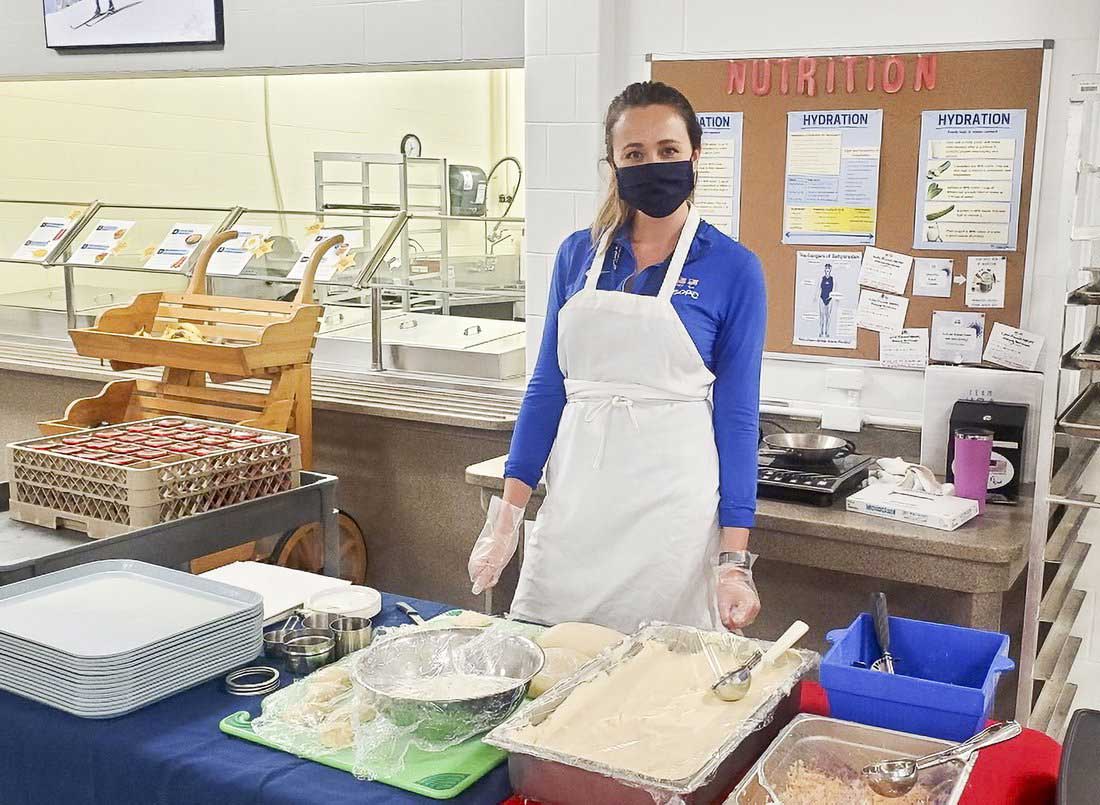
McCrudden has insight into the mindset of athletes. She is a former captain and four-year member of the Orange rowing team who collected national scholar-athlete honors her senior year. “I have a lot of compassion for the athletes because I try to put myself in their shoes,” says McCrudden, who counts completing the 2019 New York City Marathon among her athletic feats. “It’s a high-stress, competitive environment, so I want to make sure they’re nourished and feeling confident.”
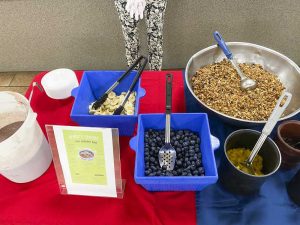
The training center hosts an assortment of different camps and teams, with athletes coming and going depending on training and competition schedules. Along with Olympic hopefuls, McCrudden has worked with the national wheelchair basketball team, U.S. junior national teams, even rhythmic gymnasts. When she started the position last January, COVID presented its own challenges. Athletes who’d traveled were quarantined in their rooms, and she did her best to fulfill special food requests. For a time, athletes who trained at the center were required to stay there as well. “They weren’t able to go out to get food on their own, so making sure they had access was huge,” she says. “It was important for them to have the comfort of going to the cafeteria and having whatever ritual food they want or what they need to perform at their top level.”
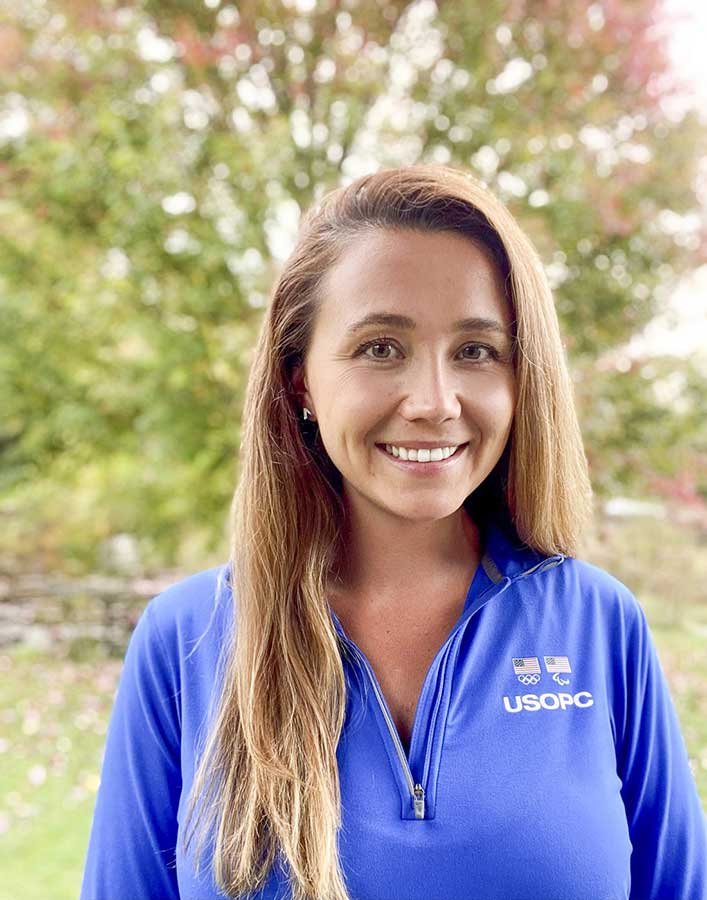
A Foodie Finds Syracuse
McCrudden’s interest in food and nutrition grew out of her childhood and helped lead her to Syracuse University. With a Polish grandmother and a Chinese grandfather, she was introduced to cuisine combining the two cultures—mixing pierogies with dumplings, for instance. She enjoyed spending time in the kitchen with her grandmother and mother and loved cooking. “I’ve always been pretty much a foodie,” she says. “Everyone grows up with different concepts of food. For me, food makes me feel loved.”
When it came time for college, an Orange attraction couldn’t be overlooked. Her sister, Natalie ’12, was studying engineering at Syracuse and a member of the rowing team. “To become a registered dietitian requires a lot of planning, so when I was looking at universities, Syracuse definitely stuck out,” she says. “Falk’s nutrition program has all the credentials to get into a dietetic internship, which would be my next step after graduation.”
McCrudden, who is dyslexic, says the support she received from Falk and the University community was “amazing.” As a student-athlete, she appreciated the access she had to tutors and resources and the responsiveness of faculty members. “If you reach out to people on campus, everyone is super and, from my experience, willing to help you,” she says. “Everyone at Syracuse is cheering you on, trying to get you to be your best in the classroom, on the fields or on the water.”
McCrudden fondly recalls a class on intuitive eating and mindfulness, which focused on partaking in special treats by savoring the flavors and taking your time eating them. “Enjoy it,” she says. “That’s the main thing.” Falk’s nutrition counseling program—which pairs nutrition majors with students seeking guidance—also proved influential to her career. “It was so helpful because you can read things in books, but then you go into a conversation with someone and you think it’s going one way and it goes a completely different way,” she says. “I really benefited from having exposure and access to different opportunities and professors to guide me through what it is to be a dietitian because we’re never dealing with the perfect patient and nobody eats the perfect diet.”

Growing with New Opportunities
McCrudden was first drawn to sports nutrition during a summer internship before her senior year, when she worked with the New York Giants’ dietitian at MetLife Stadium doing food demonstrations and nutrition education during the team’s rookie training camp. After graduation, she pursued a master’s degree in nutrition and dietetics at Saint Elizabeth University and tackled her dietetic internship requirements, logging 1,200 hours of supervised practice working in various hospital settings as well as doing counseling and community outreach. She was also a volunteer coach and nutritionist for her high school rowing team in Ridgewood, New Jersey.
McCrudden started her career as a clinical dietitian with Alaris Health, working as a department head in sub-acute rehabilitation and long-term care facilities in New Jersey. “It gave me a huge understanding of medical nutrition therapy,” she says. “I’m happy I went straight into clinical dietetics because I was dealing with patients, family members, doctors and nurses, and understanding the interaction between medication and the body.” Then it was on to New York City, where she served as the clinical nutrition manager at Morrison Community Living, which provides dining and wellness services for senior living centers. “From there I moved to Lake Placid, and it’s been an awesome transition,” she says.
Rolling Sushi, Rocking Orange
McCrudden does some coaching herself at Lake Placid, guiding athletes through a weekly cooking class. The classes are educational—nutrition focused—and a great team-building exercise. Her favorite class so far: sushi rolling. “We probably had 40 people doing sushi in waves,” she says. “We’d have different start times and stagger them. It was really fun. All the different teams liked competing against each other. Sushi became a competitive sport.”
Mix that competitive spirit with her enduring Orange spirit and it’s easy to see why McCrudden enjoys Lake Placid. She and her husband, former Orange rower Mac Zink ’14, were married last summer and have embraced life in the Adirondacks, adding hiking and snowshoeing to their activities. They also remain tight with their ’Cuse alumni network of former rowers and other friends. “Being a Syracuse graduate means the world to me,” she says. “Syracuse completely prepared me for each step of the way into the world of nutrition. I accomplished so much there. I met so many great friends—and we’re all obsessed with Syracuse.”
A Syracuse University story by Jay Cox originally published on February 1, 2022.
Dean’s Winter Welcome
Dear Falk Students,
Welcome back to Syracuse University! We hope you enjoyed your winter break and had the opportunity to relax and spend time with friends and family. We’re excited for all that lies ahead for you in Spring 2022. With that in mind, here are some important reminders as we start the new semester:
Public Health and University Communications:
Public health remains a critical priority for life on campus and in our wider Syracuse community. We fully expect all Falk College students to follow University public health guidelines and local public health mandates. By doing our part, we can keep each other safe and healthy. Please visit the Stay Safe website, the official source of public health information for Syracuse University, for guidance and updates.
Remember to check your Syracuse University email daily, as it is the primary communication method at the University. Your professors and University offices will contact you with important information using your Syracuse University email address (ending in “@syr.edu”), not your personal email address.
Student Support Services:
Falk Student Services counselors are here to provide you with private academic advising and help you meet your requirements and goals. In addition, they are your resource for private consultation related to student social and emotional concerns. If you have any concerns throughout your academic career, please contact Student Services or visit Suite 330 Barclay Hall in the Falk Complex.
Falk Career Services advisors, also located in Suite 330 Barclay Hall, can help you prepare for life after college through career exploration, internship and job searching, professional networking, and more. You can also search for opportunities through Handshake, the University’s job search and professional events portal.
In addition, you can connect to spiritual life on campus at Hendricks Chapel, and health and counseling services in the Barnes Center at the Arch.
Student Lounges, Computer Labs, and Cafés:
The Student Lounge, located in Falk 216, is available to you any time the Falk Complex is open. The lounge has a microwave, refrigerator, and vending machines for student use. Just down the hall is Falk 229. This quiet student lounge has both Windows and Mac computers that are available to students any time the Falk Complex is open.
Falk 113, 400, and 407 are Windows computer labs that are also used as teaching classrooms. They are available to students any time class is not in session. You may check the schedule of availability using the Orange Events website. You may also use the quick-print stations in Falk 216 and 229 for printing and email. These stations log out automatically after 15 minutes of use.
The Falk Café on 2 is expected to open Feb. 2 on a limited basis. Check the Food Services website for other campus cafés and operating hours, which are subject to change.
Ways to Get Involved:
Get to know many of the hundreds of Syracuse University student organizations at the Winter Student Involvement Fair 11 a.m. to 3 p.m. Jan. 26, 2022, in Goldstein Auditorium, Schine Student Center.
You can also discover activities and events on campus by visiting the Syracuse University Calendar. Please note that events are subject to change according to public health guidelines. You can find the most up-to-date event information on the University Calendar. Once again, visit the Stay Safe website regularly for public health information and watch your University email for important announcements.
There are many other resources available to you at Syracuse University beyond these important highlights. Please visit the For Students page to review a more comprehensive listing of student resources to enhance your experience at Syracuse.
Thank you for being part of the wider Syracuse University community and our Falk College family. On behalf of the Falk faculty and staff, I wish you the best for Spring 2022.
Go Orange!
Diane Lyden Murphy, M.A., M.S.W., Ph.D.
Dean
Falk College
Page 7 of 21
